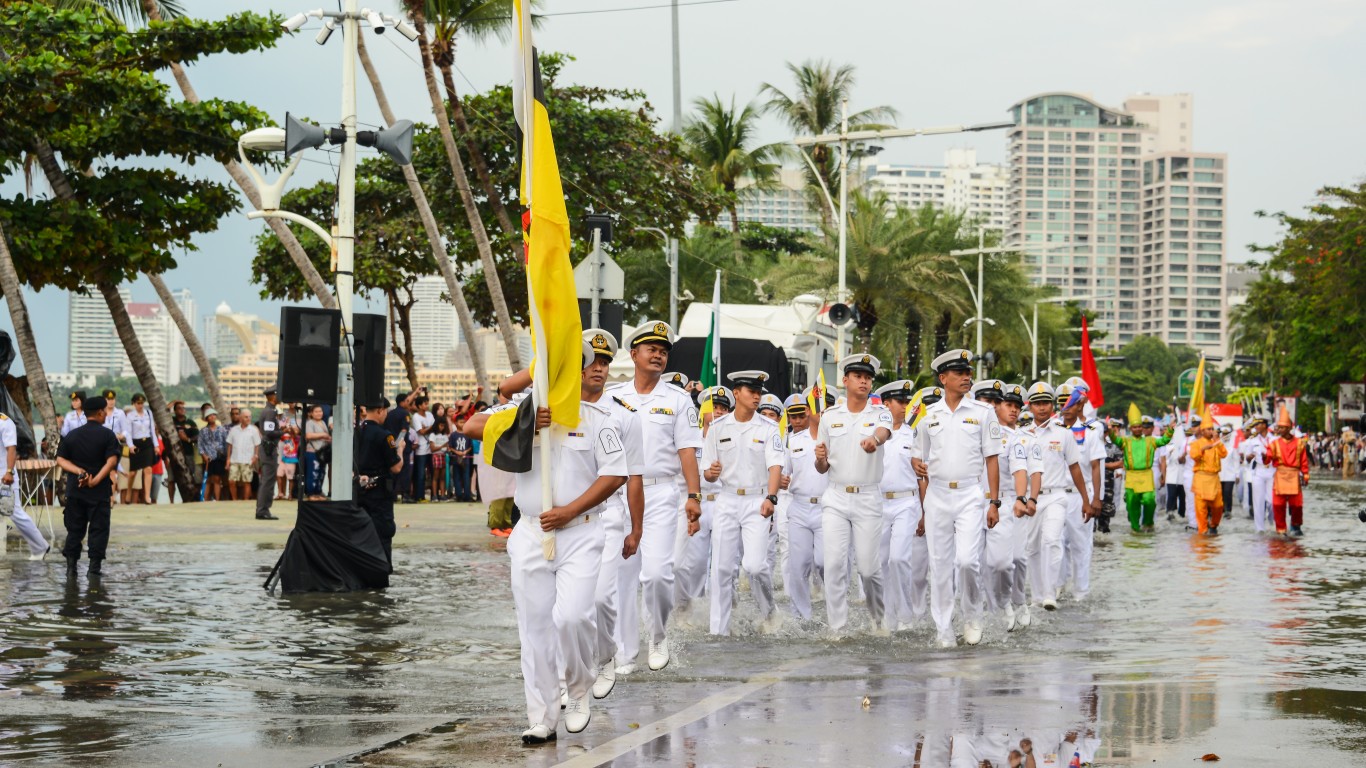
The United States has a massive military presence in the world, and to achieve military superiority, it spends more on defense annually than the next 10 countries combined, a list that includes China, Russia, and four of the largest European Union state military budgets. The recently-passed debt limit deal in the U.S. Congress would increase military spending to $886 billion in the next fiscal year and $895 billion in 2025.
The U.S. maintains this defense capability with a relatively low share of its citizens serving in its all-volunteer active-duty military. Though 1.39 million Americans serve in the world’s third-largest military force after China and India, that amounts to just 0.4% of the population. (These are the countries where America has the most soldiers.)
By comparison, the top 30 countries with the biggest share of their citizens serving as active-duty military personnel range from 0.6% in Russia to 4.41% in North Korea.
To find the countries where the largest share of the population serves in the military, 24/7 Wall St. reviewed the CIA World Factbook’s Military and security service personnel strengths, which provides 2022 CIA estimates of each country’s active-duty military force. Countries are ranked by the share of the country’s population serving as active duty personnel.
Low-population countries tend to have larger shares of their populations serving in the military, while countries with the highest populations demand less from their citizens. For example, China taps only 0.14% of its population to maintain a 2-million-strong active-duty military force, while Brunei, with a population of just 485,000, requires 1.24% of its population to maintain 6,000 active-duty military personnel.
North Korea and Eritrea, which is unflatteringly nicknamed “Africa’s North Korea” because of its oppressive and isolationist form of government, top the list. They are also the only countries with a share of their population serving in the military that tops 2%. More than one out of 100 citizens are active-duty military personnel in 11 other countries, including Israel, Greece, South Korea, and Armenia.
A third of these countries rely on voluntary enlistment, while the rest have some form of mandatory service, typically targeting able-bodied males shortly after they become adults. Out of the top 10 countries with the largest share of their populations serving in the military, only Lebanon relies on voluntary enlistment after it lifted mandatory enlistment in 2007. (These are 13 countries with required military service for men and women.)
Russia has been aggressively drafting men, including inmates, to fight its war with Ukraine, while Ukraine has used mandatory enlistment to more than triple the size of its active-duty military since Russia’s invasion in February 2022.
Here are the countries with the largest share of civilians serving in the military.
Click here to see our detailed methodology.
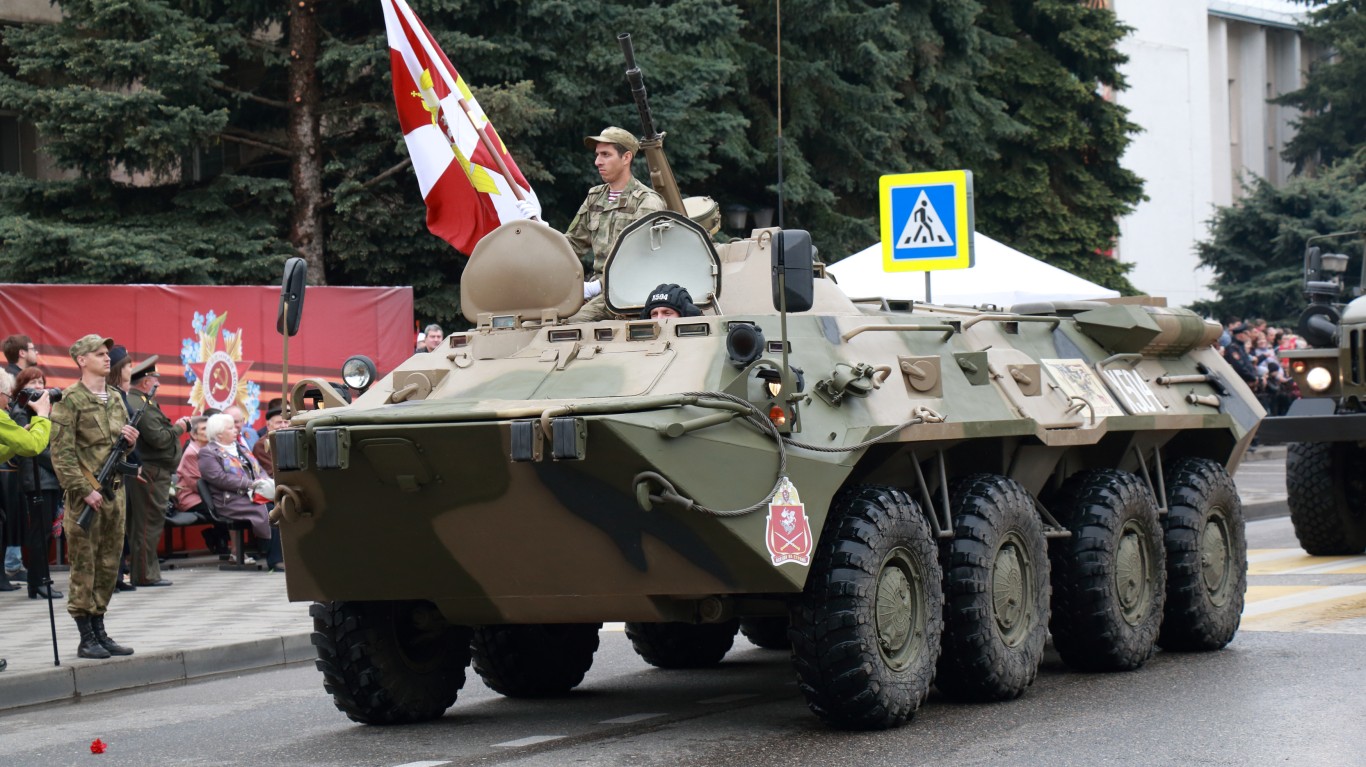
30. Russia
> Pct. population who are military personnel: 0.60% or 6.0 per 1,000
> Active-duty personnel: 850,000 — #5 largest of 168 countries
> Population: 141,698,923
> Military expenditure, 2022: $86.4 billion — #3 highest of 162 countries
> Region: Central Asia
Russia’s invasion of Ukraine has led to a sharp increase in the country’s number of active personnel. Last year, President Vladimir Putin signed a decree increasing the number of active-duty personnel by 137,000 to 1.15 million, Reuters reported. This count does not include private troops, like the estimated 50,000 that have been deployed to Ukraine.
[in-text-ad]
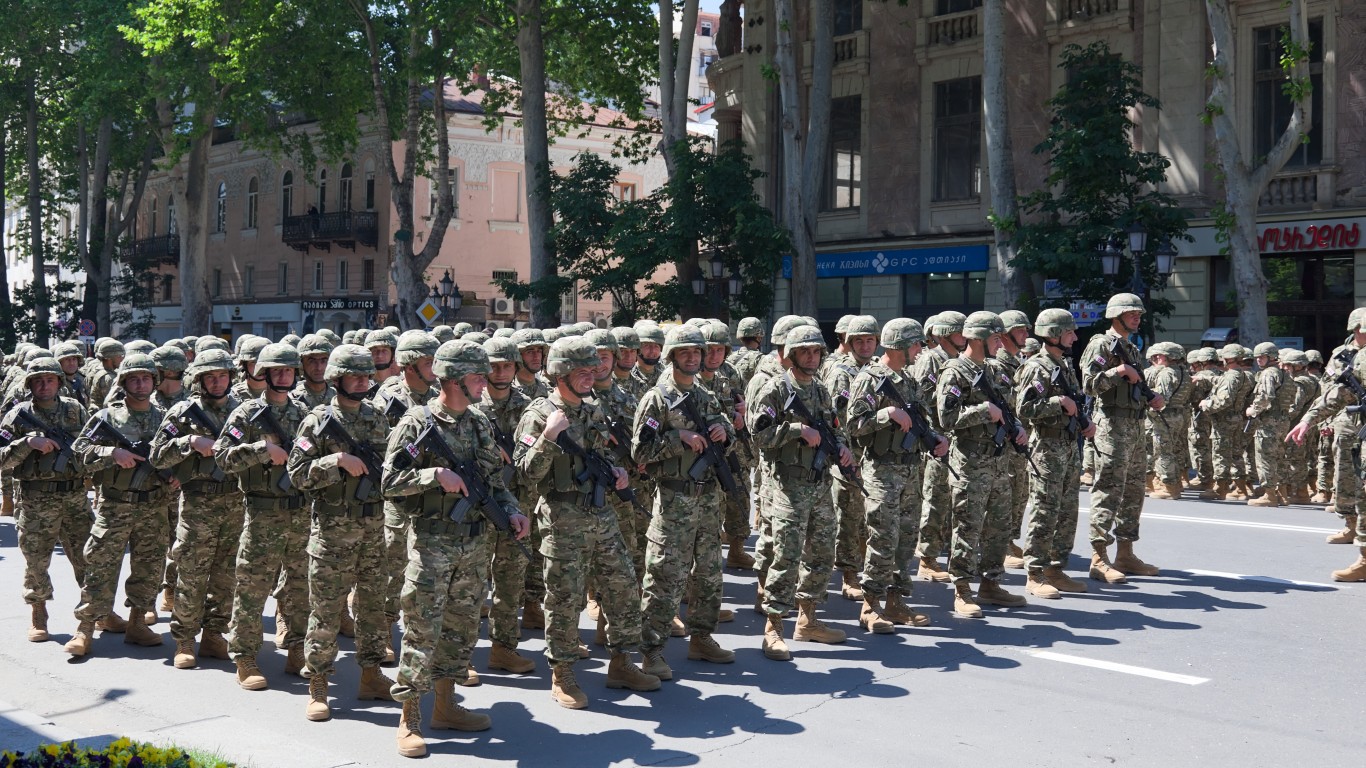
29. Georgia
> Pct. population who are military personnel: 0.61% or 6.1 per 1,000
> Active-duty personnel: 30,000 — #76 largest of 168 countries
> Population: 4,936,390
> Military expenditure, 2022: $360.3 million — #110 highest of 162 countries
> Region: Middle East
Estimates vary on the number of active-duty military personnel in this former Soviet-occupied country that now works closely with the U.S. and NATO. The country’s soldiers have been deployed with NATO troops in Afghanistan, and it is currently bolstering its territorial defense and resilience capabilities in response to Russia’s invasion of Ukraine. Russia invaded Georgia in 2008, which led to the carving out of two pro-Russian separatist regions: South Ossetia and Abkhazia.
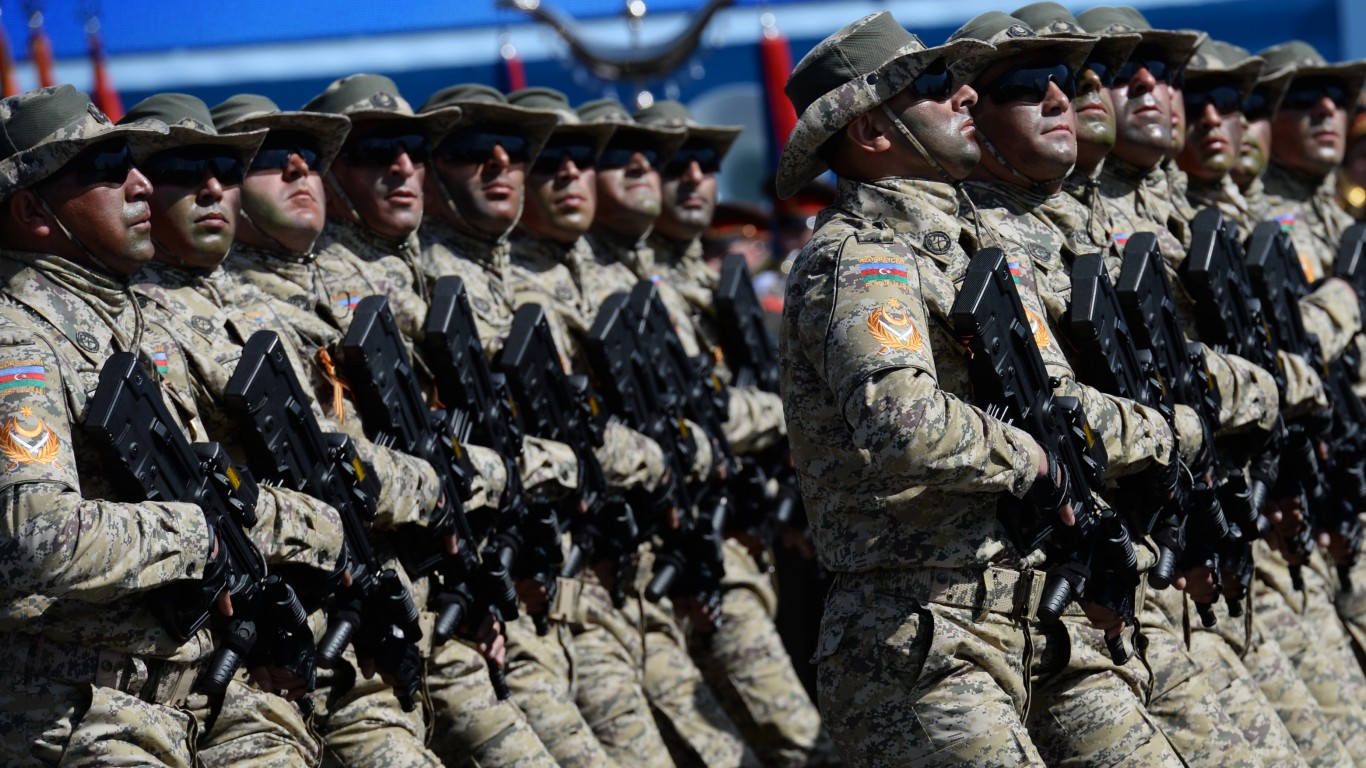
28. Azerbaijan
> Pct. population who are military personnel: 0.62% or 6.2 per 1,000
> Active-duty personnel: 65,000 — #57 largest of 168 countries
> Population: 10,420,515
> Military expenditure, 2022: $3.0 billion — #56 highest of 162 countries
> Region: Middle East
Like some other countries on this list, estimates on the size of the Azerbaijani armed forces vary, but the oil-rich country is considered to have the strongest military force in the three South Caucasus countries, including Armenia and Georgia. The U.S.-based Global Firepower military tracker platform estimates that on top of the 65,000 active-duty troops, Azerbaijan has 300,000 reserve troops and 15,000 paramilitary personnel.
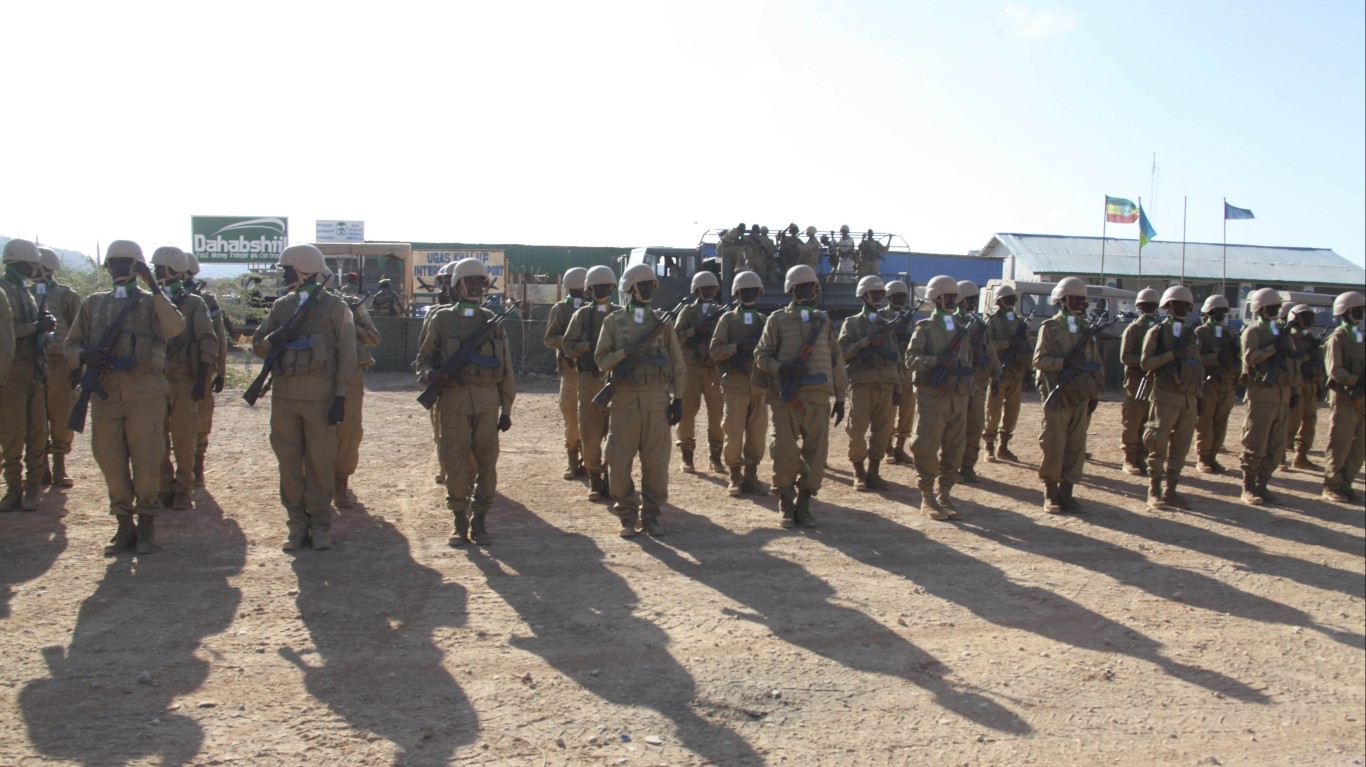
27. Iran
> Pct. population who are military personnel: 0.63% or 6.3 per 1,000
> Active-duty personnel: 550,000-600,000 — #9 largest of 168 countries
> Population: 87,590,873
> Military expenditure, 2022: $6.8 billion — #35 highest of 162 countries
> Region: Middle East
As the most populous country in the Middle East, Iran maintains significant military capabilities through its conventional army and its Revolutionary Guard, not including its sizable national police force. Iran, which is supplying Russia with drones in Moscow’s war in Ukraine, is well defended by mountainous natural barriers, and its proximity to critical sea routes and the oil fields of the Gulf gives it the potential to disrupt the global economy.
[in-text-ad-2]
26. Lithuania
> Pct. population who are military personnel: 0.64% or 6.4 per 1,000
> Active-duty personnel: 17,000 — #103 largest of 168 countries
> Population: 2,655,755
> Military expenditure, 2022: $1.7 billion — #66 highest of 162 countries
> Region: Europe
The most populous of the three Baltic states, all of them NATO members, began building its armed forces after it became the first Soviet republic to declare independence from Moscow in 1990. NATO estimates that Lithuania’s active-duty soldiers are supported by 100,000 volunteer reserve forces. Russia’s invasion of Ukraine caused Lithuania to implement its largest defense and defense policy overhaul since its independence, according to the National Defense University Press.
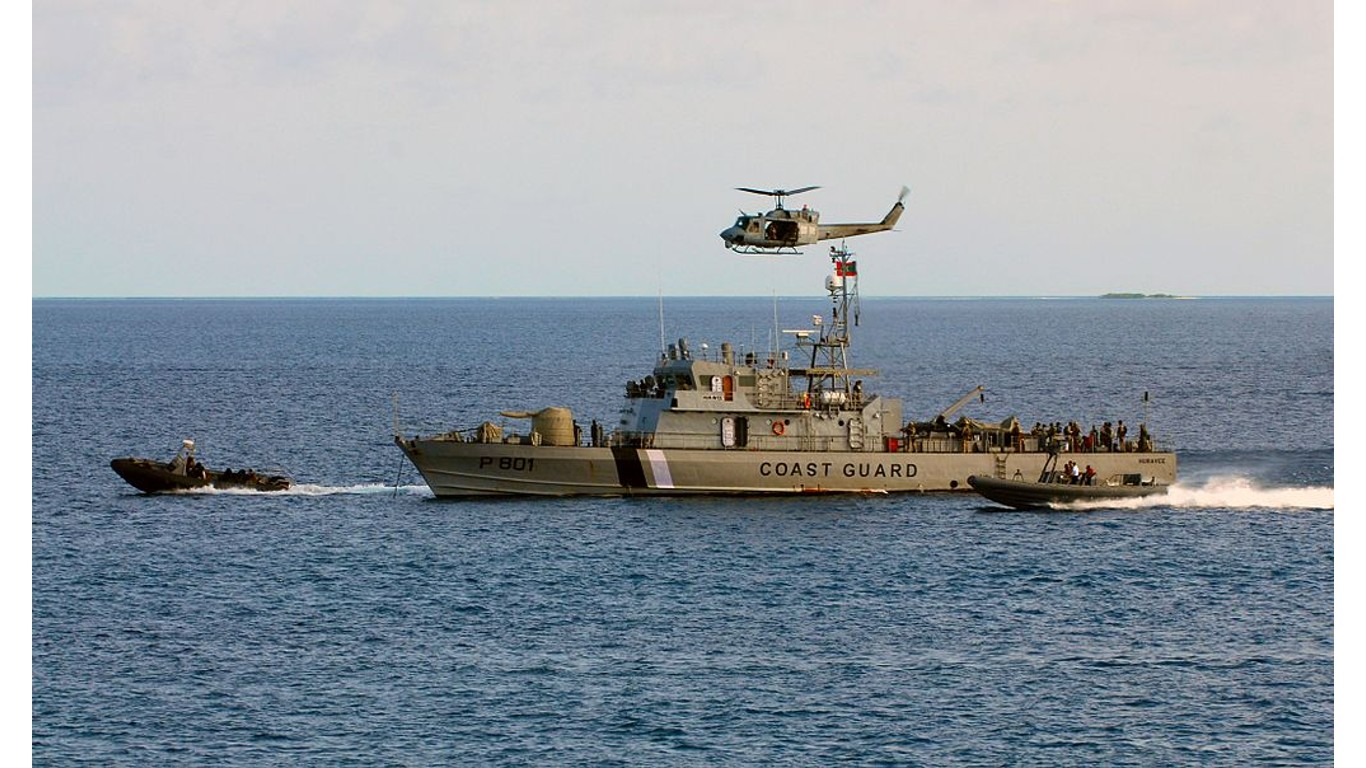
25. Maldives
> Pct. population who are military personnel: 0.64% or 6.4 per 1,000
> Active-duty personnel: 2,500 — #156 largest of 168 countries
> Population: 389,568
> Military expenditure: N/A
> Region: South Asia
This small archipelagic state in the Indian Ocean has strategic significance to India and the United States vis-à-vis China’s maritime expansion. Its National Defense Force is dedicated mainly to external security and providing natural disaster relief, but at times can be called to help local law enforcement. In 2021, U.S. Army advisors made their first trip to the Maldives to train the country’s security forces as part of a larger Indo-Pacific foreign-military mentoring program.
[in-text-ad]
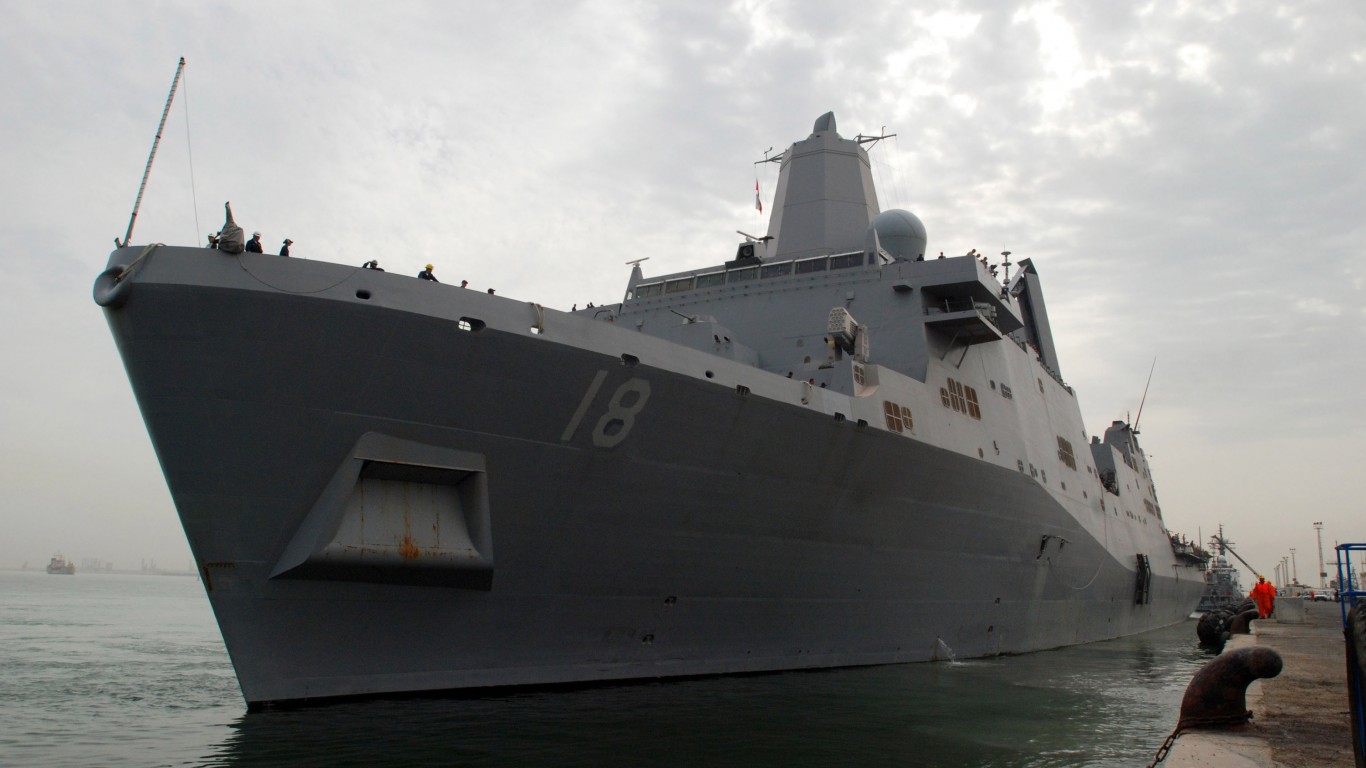
24. Bahrain
> Pct. population who are military personnel: 0.64% or 6.4 per 1,000
> Active-duty personnel: 10,000 — #127 largest of 168 countries
> Population: 1,553,886
> Military expenditure, 2022: $1.4 billion — #72 highest of 162 countries
> Region: Middle East
Situated between Saudi Arabia and Qatar in the Arabian Gulf, and historically claimed by Iran, Bahrain provides important strategic air and sea support to U.S. forces — it is the headquarters for the U.S. Fifth Fleet. The country’s population is predominantly Shi’ite but ruled by a Sunni minority of a Saudi-backed monarchy, opening the way for Iran to periodically stir the pot of discontent among Bahrain’s population.
23. Uruguay
> Pct. population who are military personnel: 0.64% or 6.4 per 1,000
> Active-duty personnel: 22,000 — #94 largest of 168 countries
> Population: 3,416,264
> Military expenditure, 2022: $1.4 billion — #73 highest of 162 countries
> Region: South America
The small and stable South American country located between much larger Argentina and Brazil does not face any major external security challenges. Its primary activities involve sea and land border patrol to combat drug trafficking, goods and weapons smuggling, livestock theft, and other crimes. Uruguay also provides soldiers for U.N. peacekeeping operations.
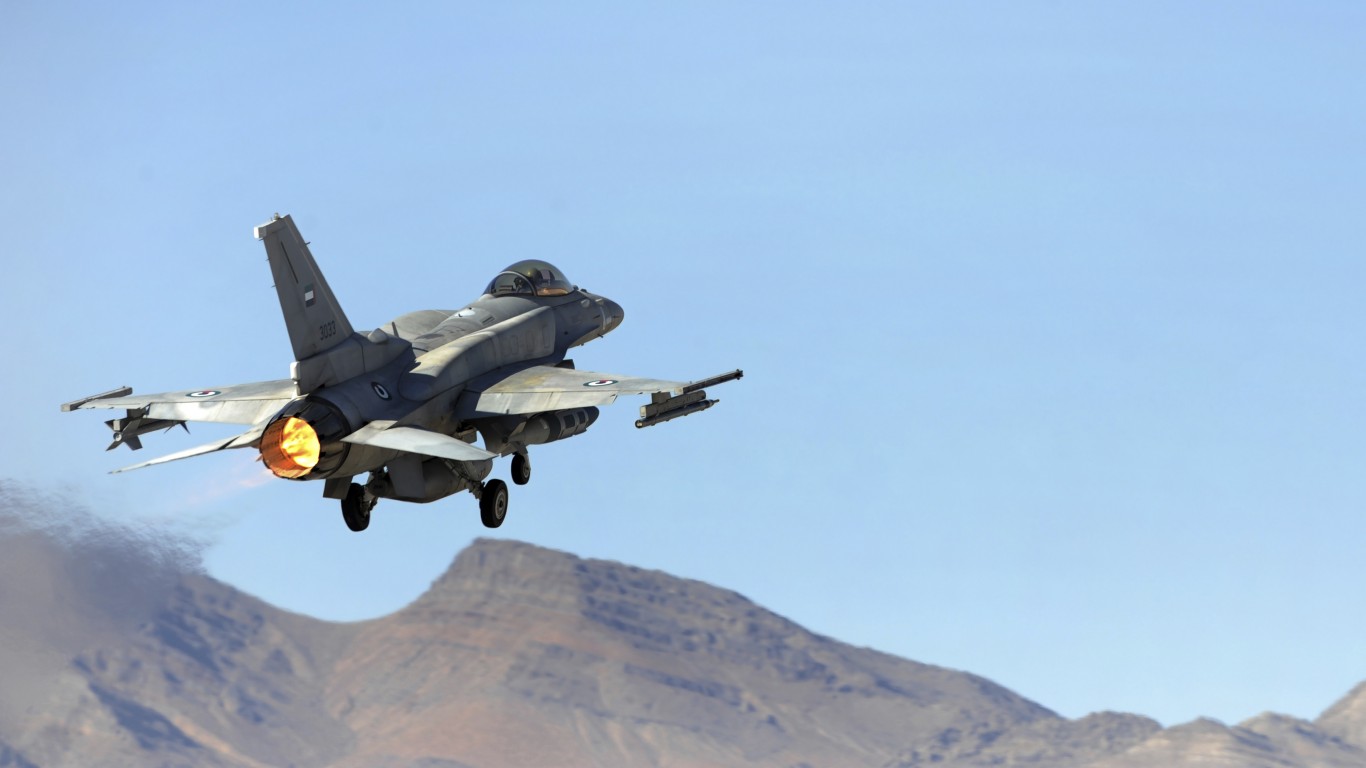
22. United Arab Emirates
> Pct. population who are military personnel: 0.65% or 6.5 per 1,000
> Active-duty personnel: 65,000 — #57 largest of 168 countries
> Population: 9,973,449
> Military expenditure, 2014: $22.8 billion — #16 highest of 162 countries
> Region: Middle East
Situated in the restive Arabian Gulf, the UAE has one of the strongest military forces in the Middle East, with soldiers trained to react quickly to attacks like the unsuccessful missile-based strikes committed in 2022 by Iranian-supported Houthi rebels from Yemen. The UAE buys modern military equipment from more than 20 countries, with the U.S. as the leading supplier.
[in-text-ad-2]
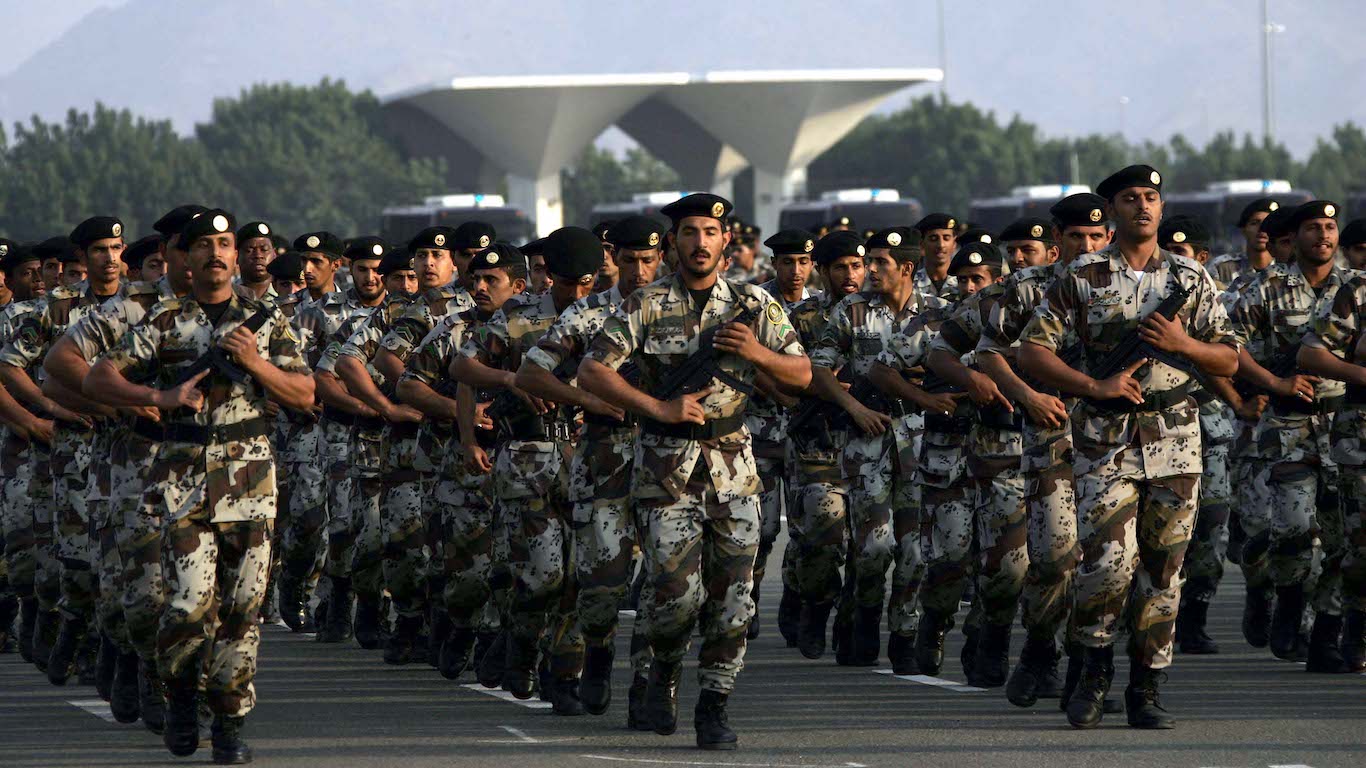
21. Saudi Arabia
> Pct. population who are military personnel: 0.70% or 7.0 per 1,000
> Active-duty personnel: 250,000 — #18 largest of 168 countries
> Population: 35,939,806
> Military expenditure, 2022: $75.0 billion — #5 highest of 162 countries
> Region: Middle East
Flush with petrodollars and located in one of the world’s hottest geopolitical zones (literally and figuratively), Saudi Arabia has spent decades building up its military capabilities, largely due to the Kingdom’s long-standing rivalry with Iran. Internal terrorist threats and an ongoing Saudi-led coalition war in Yemen has caused Riyadh to accelerate this buildup. Its close ties to the U.S., Britain, and France gives the theocratic monarchy access to training its elite forces and purchasing advanced military equipment.

20. Taiwan
> Pct. population who are military personnel: 0.72% or 7.2 per 1,000
> Active-duty personnel: 170,000 — #28 largest of 168 countries
> Population: 23,588,613
> Military expenditure, 2022: $12.5 billion — #22 highest of 162 countries
> Region: East and Southeast Asia
The self-governed island that is contentiously claimed by the People’s Republic of China maintains compulsory conscription for men born after 2005, which helps the country maintain an estimated force of 1.66 million reservists to support its active-duty service members, according to Time magazine. China’s military is massive, but military analysts argue that China would prefer to use non-military coercion to keep Taiwan on its short leash.
[in-text-ad]
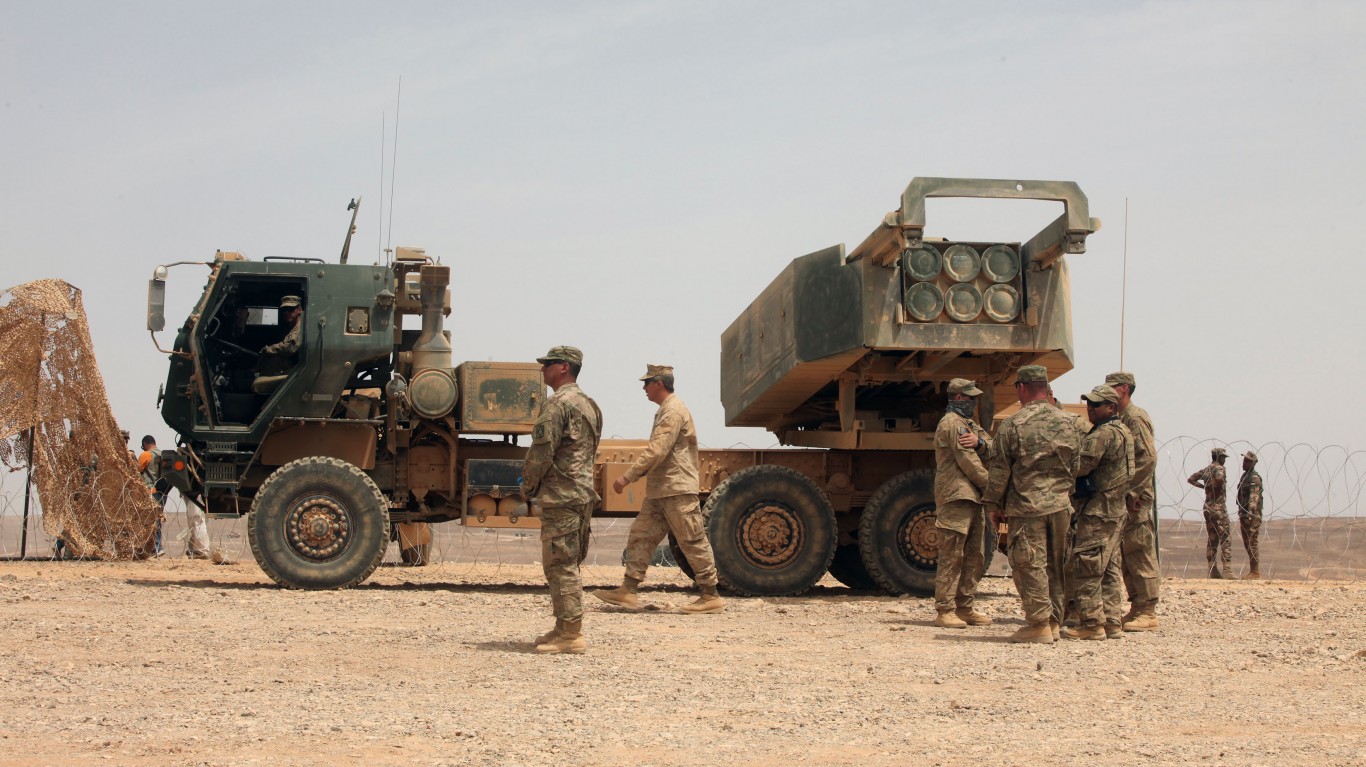
19. Jordan
> Pct. population who are military personnel: 0.85% or 8.5 per 1,000
> Active-duty personnel: 94,500 — #50 largest of 168 countries
> Population: 11,086,716
> Military expenditure, 2022: $2.3 billion — #63 highest of 162 countries
> Region: Middle East
Jordan’s military strength went on full display following the death of Moaz al-Kasasbeh, a Royal Jordanian Air Force pilot who was captured near Raqqa, Syria, and later burned to death by ISIL militants. The killing inspired more public support for Jordan’s participation in airstrikes against Islamic State militants in Syria’s ongoing civil war. Jordan targeted and reportedly killed dozens of ISIL fighters, showcasing the country’s air force capabilities. In addition to a formidable air force, Jordan is a global center for special forces training.
18. Bhutan
> Pct. population who are military personnel: 0.91% or 9.1 per 1,000
> Active-duty personnel: 8,000 — #135 largest of 168 countries
> Population: 876,181
> Military expenditure: N/A
> Region: South Asia
This tiny, landlocked mountainous country between Tibet and Bangladesh initiated military conscription of youths 18 or older in 2022. The Bhutanese newspaper reported in 2019 that the draft would last 12 months but that nine of those months would be devoted to “shaping up and familiarizing the youth with necessary life and vocational skills.” The remotely situated Buddhist monarchy is located close to two global military superpowers — China and India — and as such relies on India for its defense of external threats in the event of any regional confrontation.
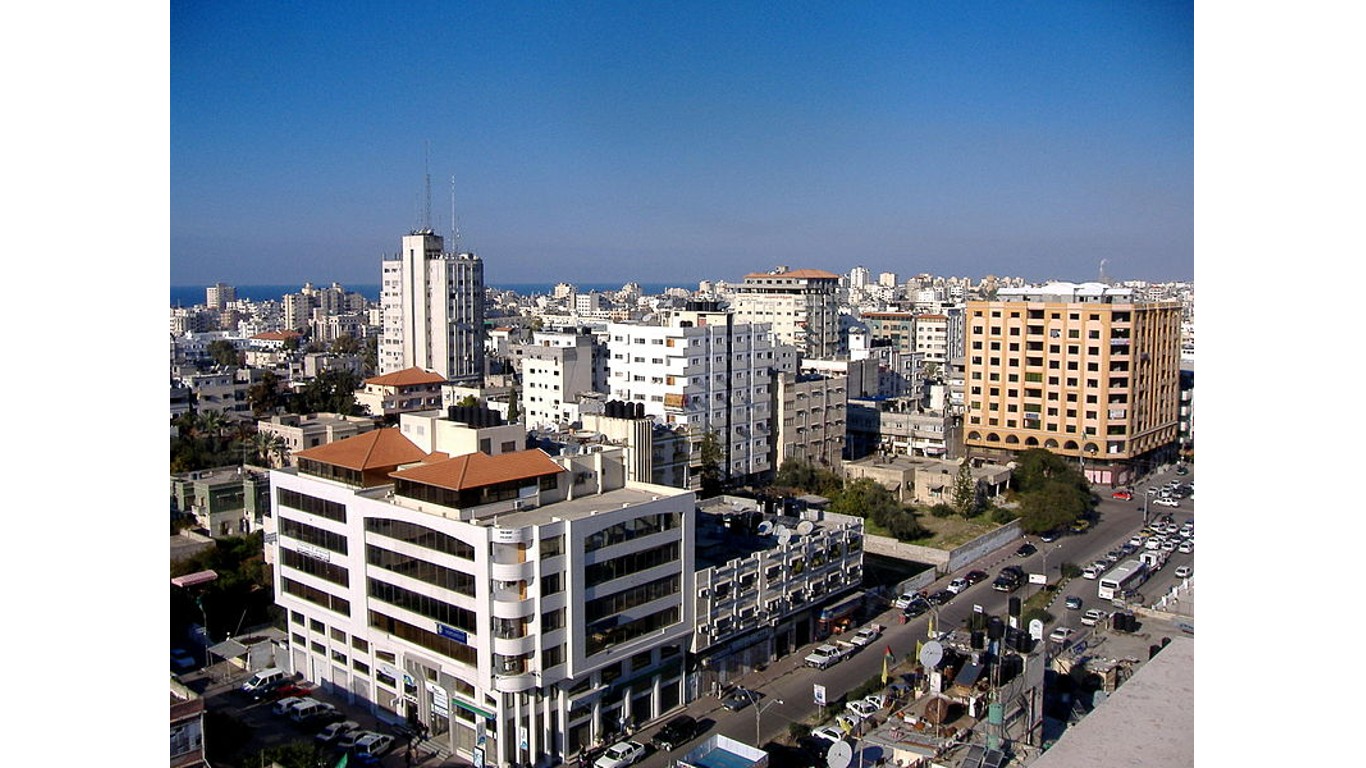
17. Gaza Strip
> Pct. population who are military personnel: 0.98% or 9.8 per 1,000
> Active-duty personnel: 20,000-25,000 — #97 largest of 168 countries
> Population: 2,037,744
> Military expenditure: N/A
> Region: Middle East
While the Palestinian National Security Forces technically covers the Gaza Strip and the Palestinian enclaves of the West Bank, the primary militant force in the Gaza Strip are fighters from the military wing of Hamas, the ruling Sunni nationalist political organization that took control in 2007. Though the weaker party in the conflict with Israel, Hamas routinely launches ground-to-ground missile attacks on Israel, most of which are intercepted by Israel’s Iron Dome defense system.
[in-text-ad-2]
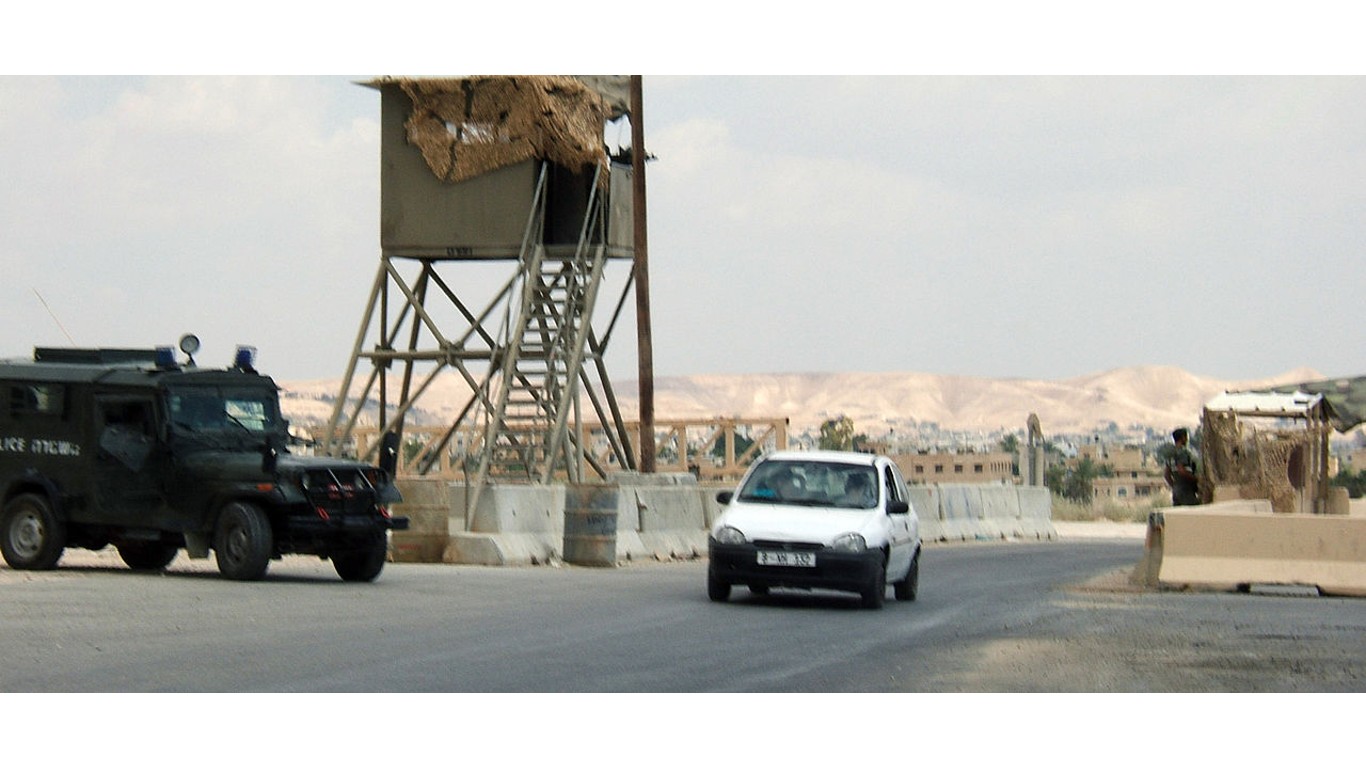
16. West Bank
> Pct. population who are military personnel: 0.98% or 9.8 per 1,000
> Active-duty personnel: 30,000 — #76 largest of 168 countries
> Population: 3,050,760
> Military expenditure: N/A
> Region: Middle East
Palestinians lack an army, air force, or navy. Since the 1993 Oslo Accords, the Palestinian National Security Forces has acted as the officially recognized paramilitary security force of the Palestinian Authority. However, the size and capabilities of this force are restricted by a bilateral agreement that gives Israel the right to object to increases in size, types of armaments, and changes to structure of the PNSF, ensuring Israel’s military dominance.
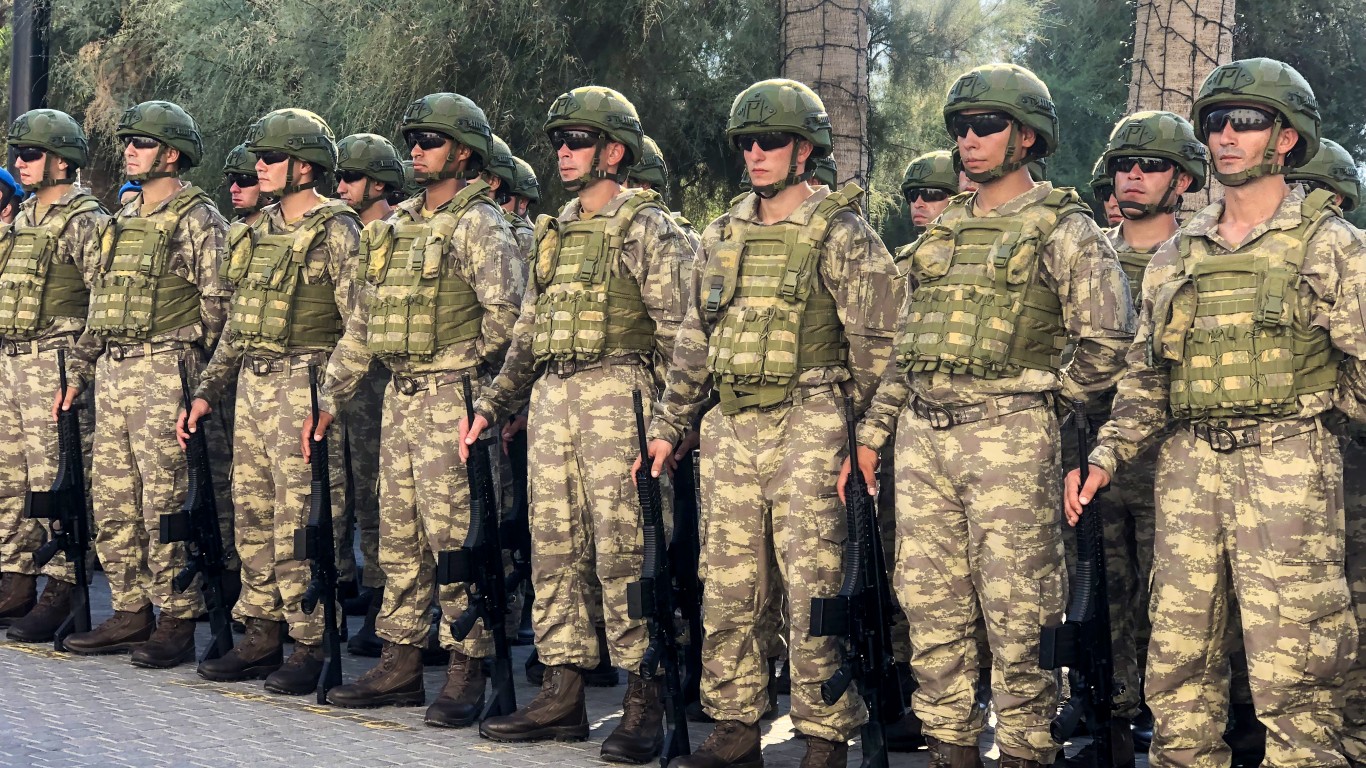
15. Cyprus
> Pct. population who are military personnel: 0.99% or 9.9 per 1,000
> Active-duty personnel: 13,000 — #116 largest of 168 countries
> Population: 1,308,120
> Military expenditure, 2022: $494.2 million — #95 highest of 162 countries
> Region: Europe
Turkey’s occupation of northern Cyprus has lasted nearly a half century, with a separation of the island’s Greek and Turkish populations maintained by a U.N. peacekeeping force. Turkey’s recently reelected President Recep Tayyip Erdoğan has been pushing for a permanent division, inspired in part by the discovery of gas deposits in nearby waters. Cyprus’s small army would be no match against Turkey, but Turkey is a NATO member, making it unlikely it would attack an EU member state. Still, there appears no end in sight to this stalemate even if Cyprus would be no match against its larger adversary.
[in-text-ad]
14. Singapore
> Pct. population who are military personnel: 1.00% or 10.0 per 1,000
> Active-duty personnel: 60,000 — #59 largest of 168 countries
> Population: 5,975,383
> Military expenditure, 2022: $11.7 billion — #23 highest of 162 countries
> Region: East and Southeast Asia
Despite Singapore’s small size, its military is one of the most well equipped in Southeast Asia. The city-state’s geography constrains the ability of its armed forces to fall back and regroup in the event of war. Singapore depends largely on reserve forces, and like most countries on this list, it has mandatory military service. All male Singaporeans and second-generation permanent residents above the age of 18 must serve in the Singapore Armed Forces.

13. Djibouti
> Pct. population who are military personnel: 1.02% or 10.2 per 1,000
> Active-duty personnel: 10,000 — #127 largest of 168 countries
> Population: 976,143
> Military expenditure, 2008: $36.3 million — #150 highest of 162 countries
> Region: Africa
This small East African country has one of the smallest militaries on this list despite the presence of armed opposition and sporadic violence. But what Djibouti lacks in military power is made up by hosting foreign bases from the U.S., France, Italy, Japan, and China. Djibouti is located at the Bab el-Mandeb strait that divides the Red Sea from the Gulf of Aden, a vital shipping route.
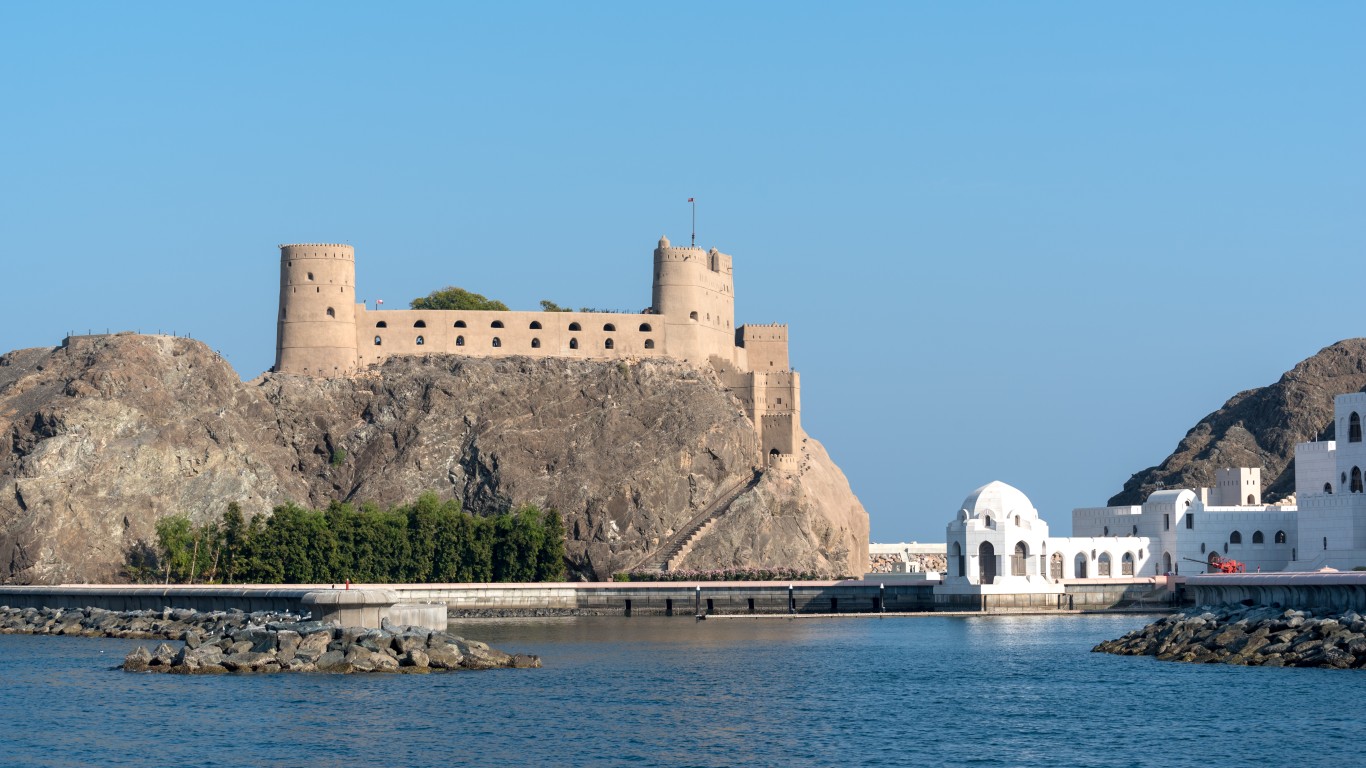
12. Oman
> Pct. population who are military personnel: 1.04% or 10.4 per 1,000
> Active-duty personnel: 40,000 — #68 largest of 168 countries
> Population: 3,833,465
> Military expenditure, 2022: $5.8 billion — #37 highest of 162 countries
> Region: Middle East
Oman has built up its military capabilities since it quelled armed internal factions with the help of the British in 1975. This small monarchy, situated at the southeastern tip of the Arabian Peninsula that divides the Arabian Gulf from the Gulf of Oman, is largely equipped with U.S. and European military hardware, including U.S.-made M60 tanks and European NH90 battlefield helicopters. Oman has been strengthening its military capabilities through side-by-side exercises with the U.S. Army.
[in-text-ad-2]
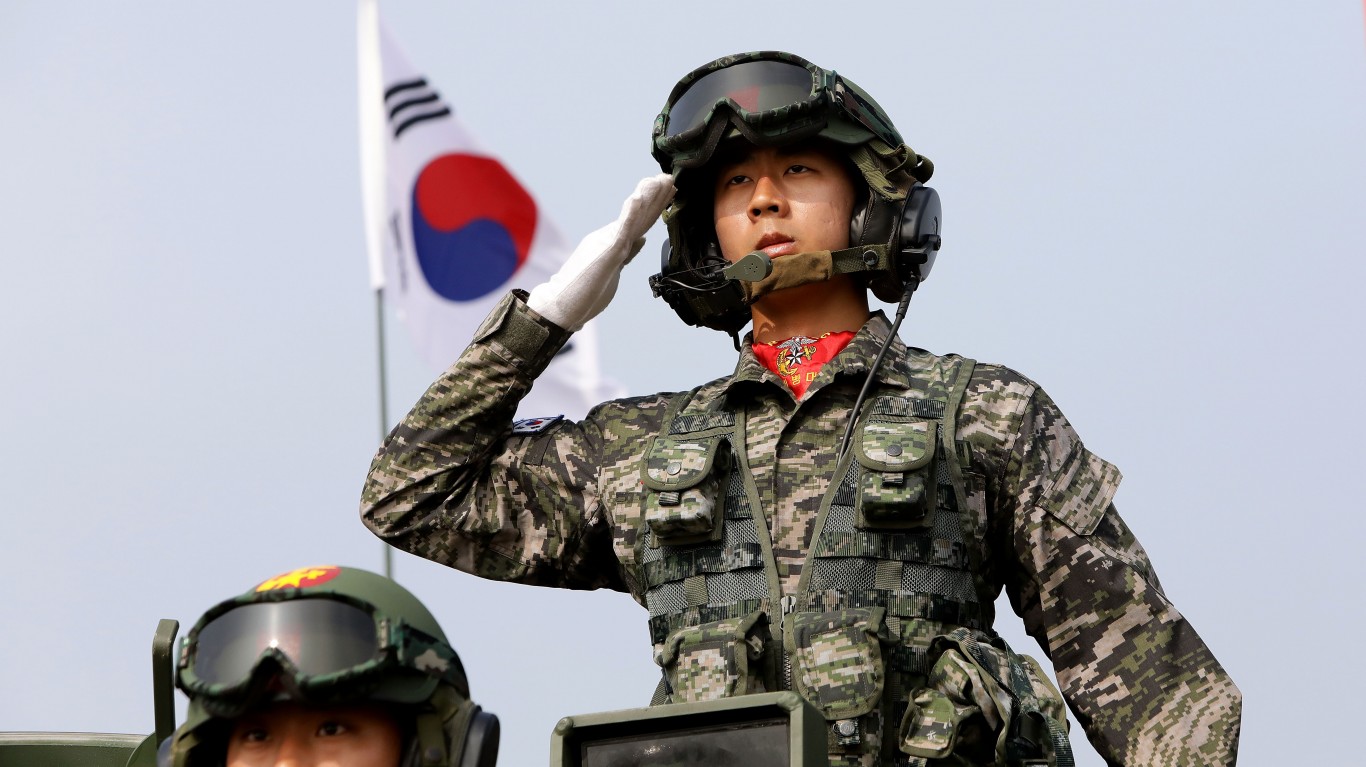
11. Korea, South
> Pct. population who are military personnel: 1.07% or 10.7 per 1,000
> Active-duty personnel: 555,000 — #8 largest of 168 countries
> Population: 51,966,948
> Military expenditure, 2022: $46.4 billion — #9 highest of 162 countries
> Region: East and Southeast Asia
Considering the long-simmering animosity between the countries that share the Korean Peninsula, it is no surprise that both Koreas make this list. North Korea, the nuclear-armed “hermit kingdom,” has a much larger military, but South Korea has more advanced military capabilities and strong U.S. military support. South Korea requires all men ages 18 to 35 to enlist, but authorities have recently considered instituting an exemption for men who have three or more babies before they turn 30 in an effort to boost the country’s flagging birth rate.
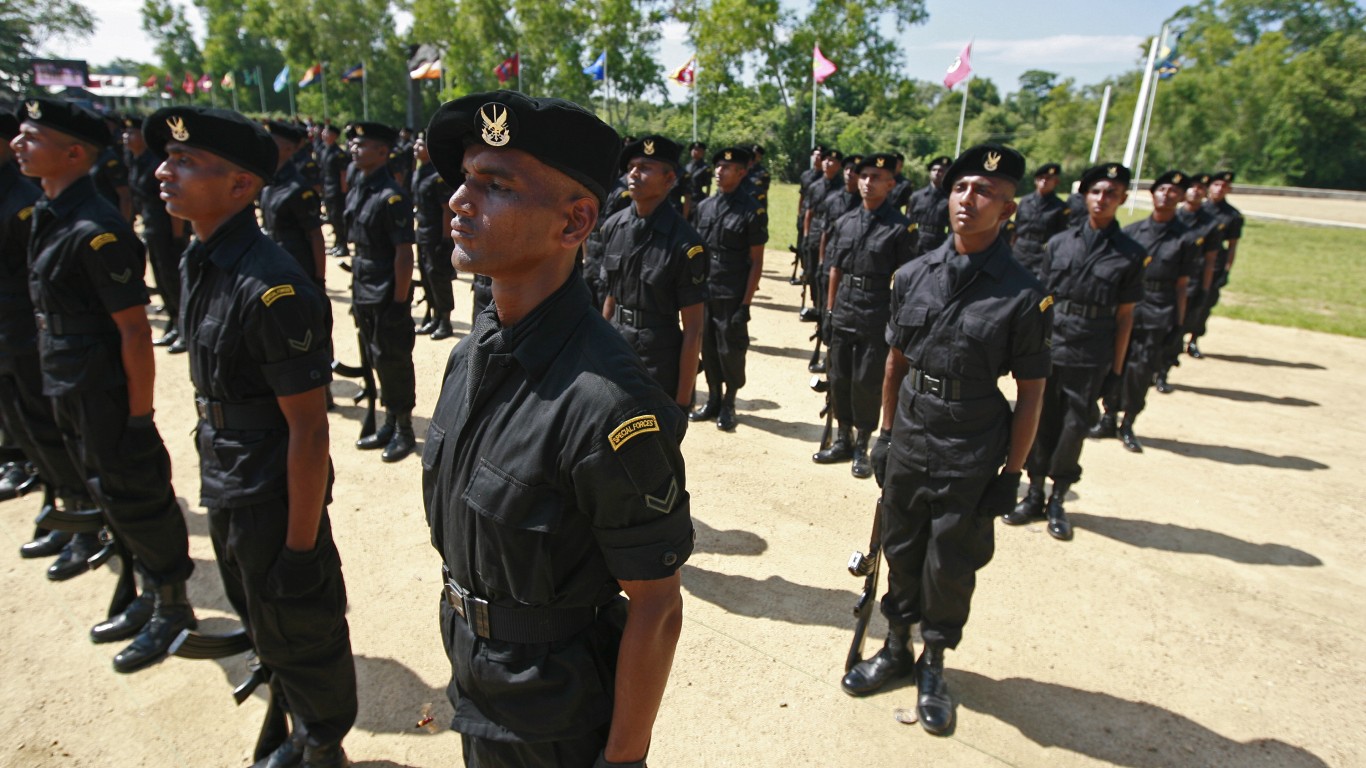
10. Sri Lanka
> Pct. population who are military personnel: 1.11% or 11.1 per 1,000
> Active-duty personnel: 260,000 — #16 largest of 168 countries
> Population: 23,326,272
> Military expenditure, 2022: $1.1 billion — #80 highest of 162 countries
> Region: South Asia
An ongoing deep economic crisis has upended Sri Lanka, leading to steep cuts to its military spending. The bankrupt island country off the southern tip of India is in the process of reducing the number of its army personnel to 135,000 by the end of next year and 100,000 by 2030.
[in-text-ad]
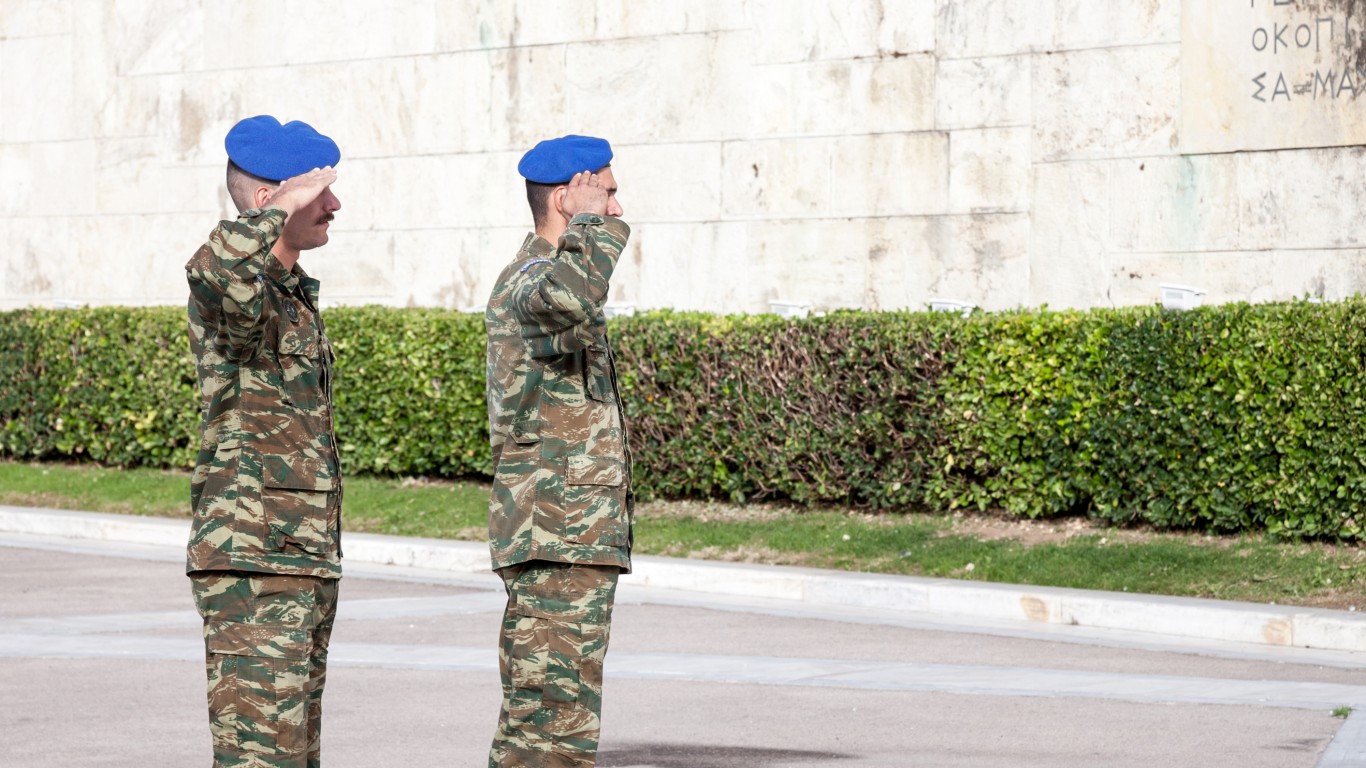
9. Greece
> Pct. population who are military personnel: 1.19% or 11.9 per 1,000
> Active-duty personnel: 125,000 — #40 largest of 168 countries
> Population: 10,497,595
> Military expenditure, 2022: $8.1 billion — #32 highest of 162 countries
> Region: Europe
The U.S.-based Global Firepower military tracker ranks Greece as the world’s 30th most powerful military. However, the country’s most threatening foe is Turkey, which is ranked 11th. Relations between the two adversaries, both members of NATO, have soured, notably after Greek Prime Minister Kyriakos Mitsotakis urged the U.S. Congress to block the sale of F-16 fighter jets to Turkey in 2022. Greece requires all Greek men between the ages of 19 and 45 to perform military service regardless of whether they have foreign citizenship and were born or live abroad.

8. Brunei
> Pct. population who are military personnel: 1.24% or 12.4 per 1,000
> Active-duty personnel: 6,000 — #144 largest of 168 countries
> Population: 484,991
> Military expenditure, 2022: $435.9 million — #99 highest of 162 countries
> Region: East and Southeast Asia
This small Southeast Asian state on the coast of Borneo has the second-smallest number of active-duty military personnel on this list, after the Maldives. The country is planning on upgrading its military assets in the next fiscal year and recently signed a contract for three Airbus C-295 military transport aircraft. Defense authorities have specifically cited climate change as one of the reasons for this initiative.
7. South Sudan
> Pct. population who are military personnel: 1.24% or 12.4 per 1,000
> Active-duty personnel: 150,000-200,000 — #32 largest of 168 countries
> Population: 12,118,379
> Military expenditure, 2022: $378.8 million — #105 highest of 162 countries
> Region: Africa
The world’s youngest nation and Africa’s 54th fully recognized country evolved its military from the Sudan People’s Liberation Army, a rebel outfit that was a main belligerent in the Second Sudanese Civil War from 1983 to 2005. The situation in South Sudan, which won its independence from the north in 2011, continues to be rife with internal conflict, including a civil war from 2013 to 2020 that ended in an unsettled stalemate. Many of South Sudan’s active-duty personnel are militia members with local authority apart from the unified forces, which is estimated to be about 50,000 to 80,000 personnel.
[in-text-ad-2]
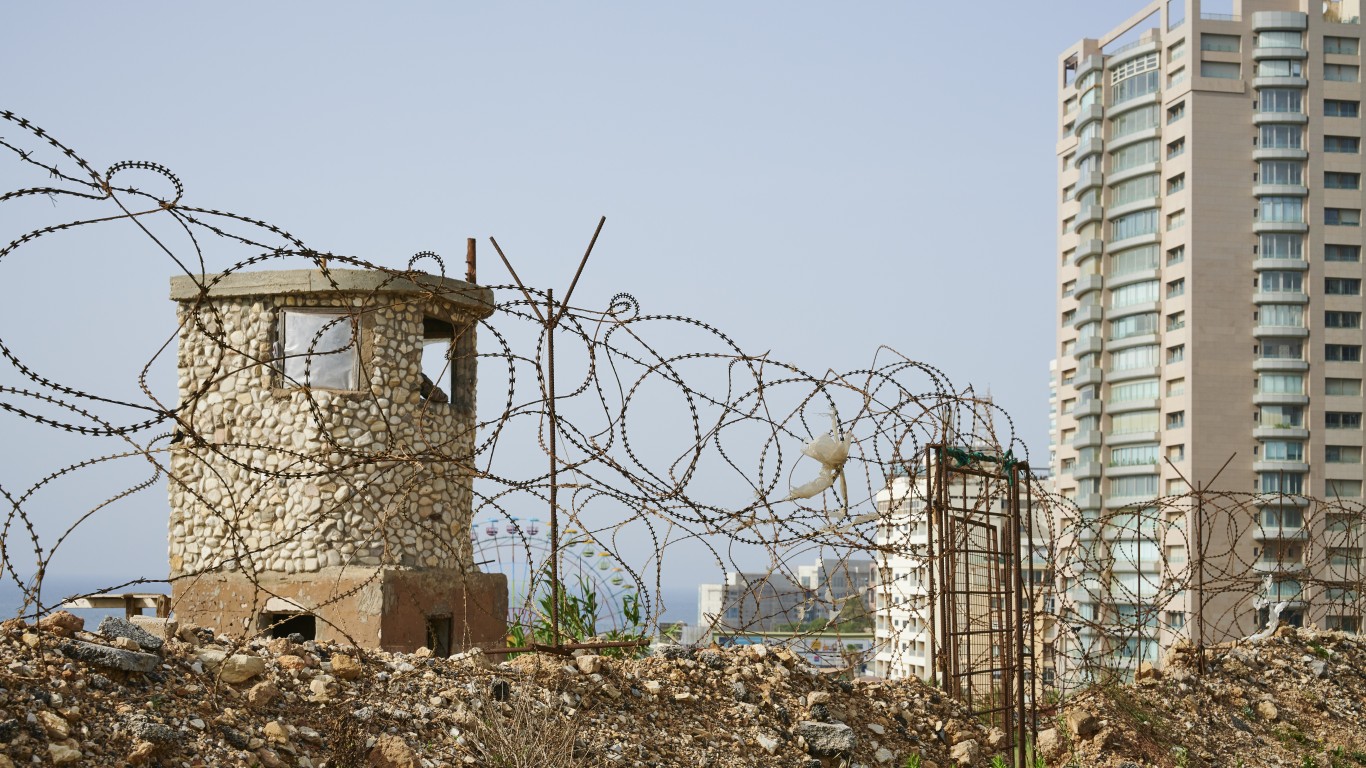
6. Lebanon
> Pct. population who are military personnel: 1.50% or 15.0 per 1,000
> Active-duty personnel: 80,000 — #52 largest of 168 countries
> Population: 5,331,203
> Military expenditure, 2022: $4.7 billion — #45 highest of 162 countries
> Region: Middle East
Lebanon’s crippling economic crisis has dealt such a blow to the salaries of the country’s security forces that the United States announced in January it would provide $72 million in cash stipends through a U.N. program. Lebanon’s security forces fight internally against the Iran-backed militant faction of Hezbollah, the Shi’ite Muslim political party. In 2007, Lebanon ended its mandatory military service policy initiated after the end of the 15-year civil war in 1990 to help reunite Lebanese youths.
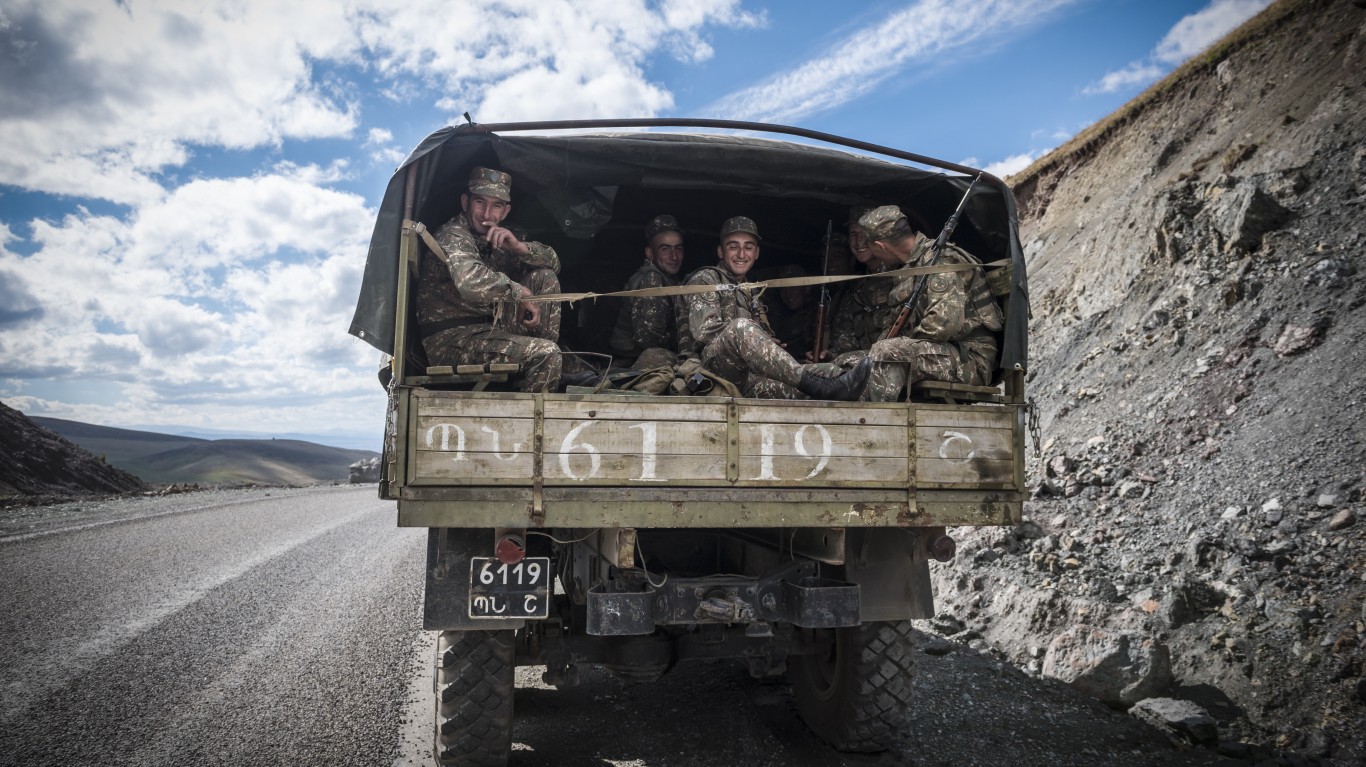
5. Armenia
> Pct. population who are military personnel: 1.51% or 15.1 per 1,000
> Active-duty personnel: 45,000 — #66 largest of 168 countries
> Population: 2,989,091
> Military expenditure, 2022: $795.2 million — #87 highest of 162 countries
> Region: Middle East
War erupted between Armenia and neighboring Azerbaijan after the collapse of the Soviet Union in 1991. The unsettled dispute centers around a long history of ethnic tensions between the two countries and the war fought over Nagorno-Karabakh, also known as Artsakh, an unrecognized breakaway republic inside Azerbaijan with close ties to Armenia. Though a Russian-brokered ceasefire was declared in 1994, intermittent clashes continue.
[in-text-ad]
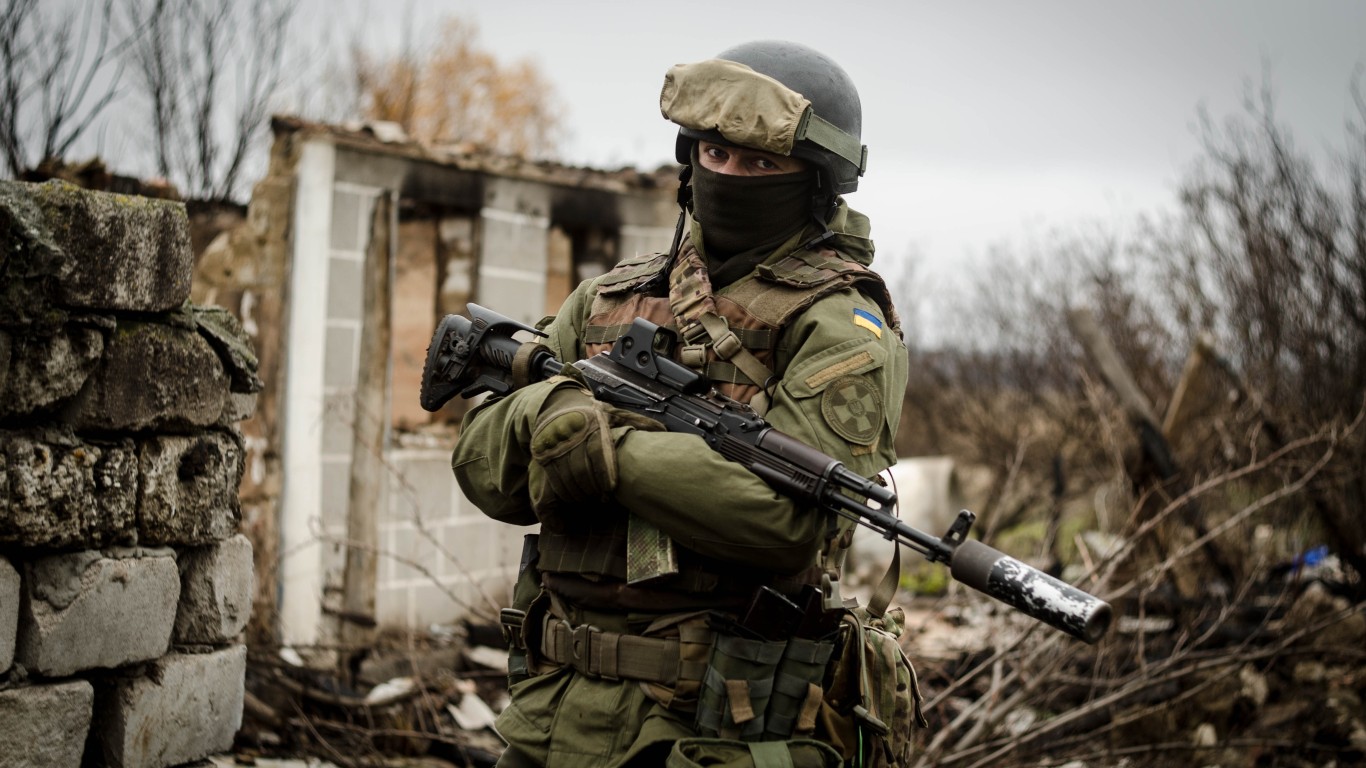
4. Ukraine
> Pct. population who are military personnel: 1.62% or 16.2 per 1,000
> Active-duty personnel: 700,000 — #6 largest of 168 countries
> Population: 43,306,477
> Military expenditure, 2022: $44.0 billion — #11 highest of 162 countries
> Region: Europe
The Russian invasion of Ukraine in February 2022 instigated a massive mobilization of Ukrainian troops, more than tripling the number of active-duty military personnel, in part through a mandatory draft of all able-bodied men aged 18 to 60 except those working in war-critical civilian jobs like manufacturing and government. Ukrainian forces have recently made advances in their effort to divide Russian troops in eastern Donbas region of Ukraine from their comrades in the southern Crimea peninsula, which Russia annexed in 2014.
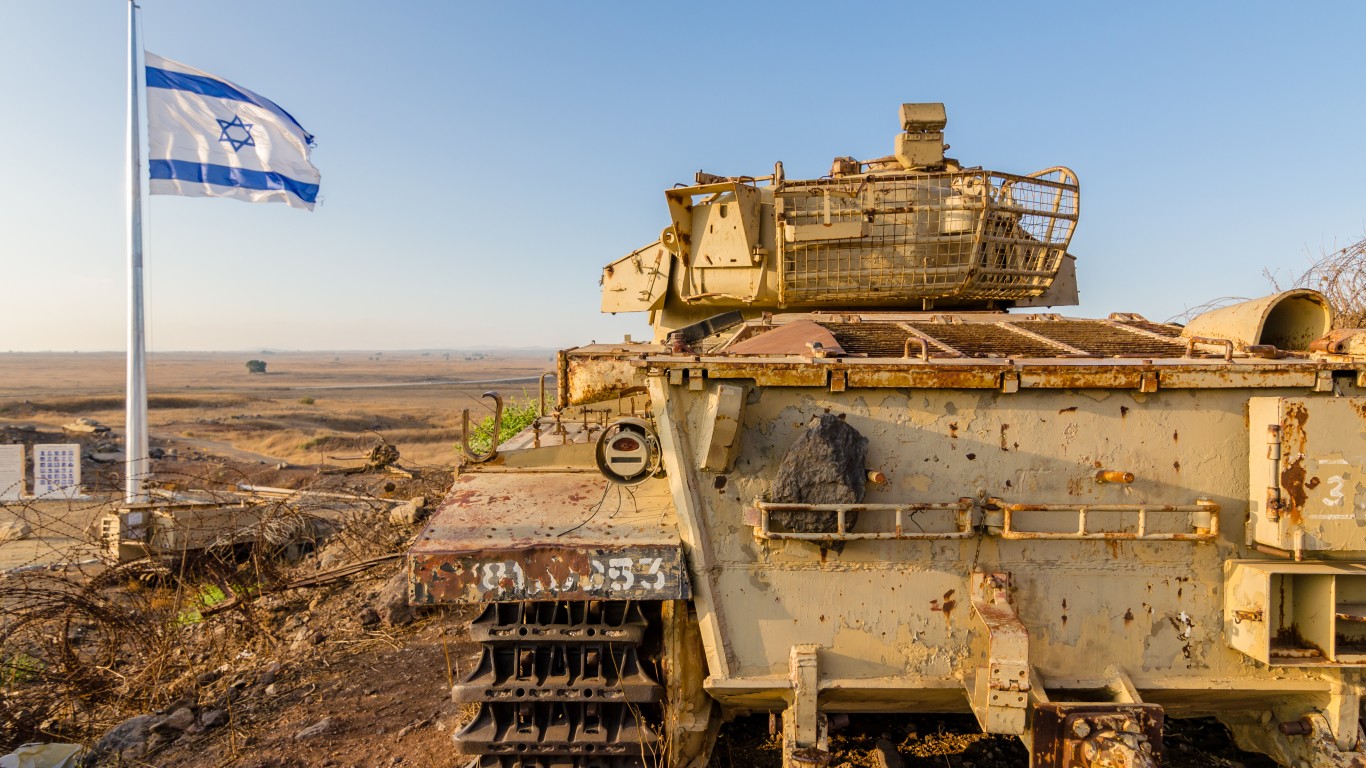
3. Israel
> Pct. population who are military personnel: 1.91% or 19.1 per 1,000
> Active-duty personnel: 173,000 — #27 largest of 168 countries
> Population: 9,043,387
> Military expenditure, 2022: $23.4 billion — #15 highest of 162 countries
> Region: Middle East
Israel has the third-largest share of citizens who are active-duty military personnel. With notable exceptions, all able-bodied Israeli citizens who are Jewish, Druze, or Circassian must serve in the IDF. Men and women are required to serve 32 months and 24 months, respectively. The Israel Defense Forces was formed days after the country’s independence in May 1948, drawing its first conscripts from Zionist paramilitary forces dating back to the 1920s. Following peace treaties with Egypt in 1979 and Jordan in 1994, the IDF has focused primarily on southern Lebanon, the Palestinian territories, and more recently engaging in skirmishes along the border with war-ravaged Syria.
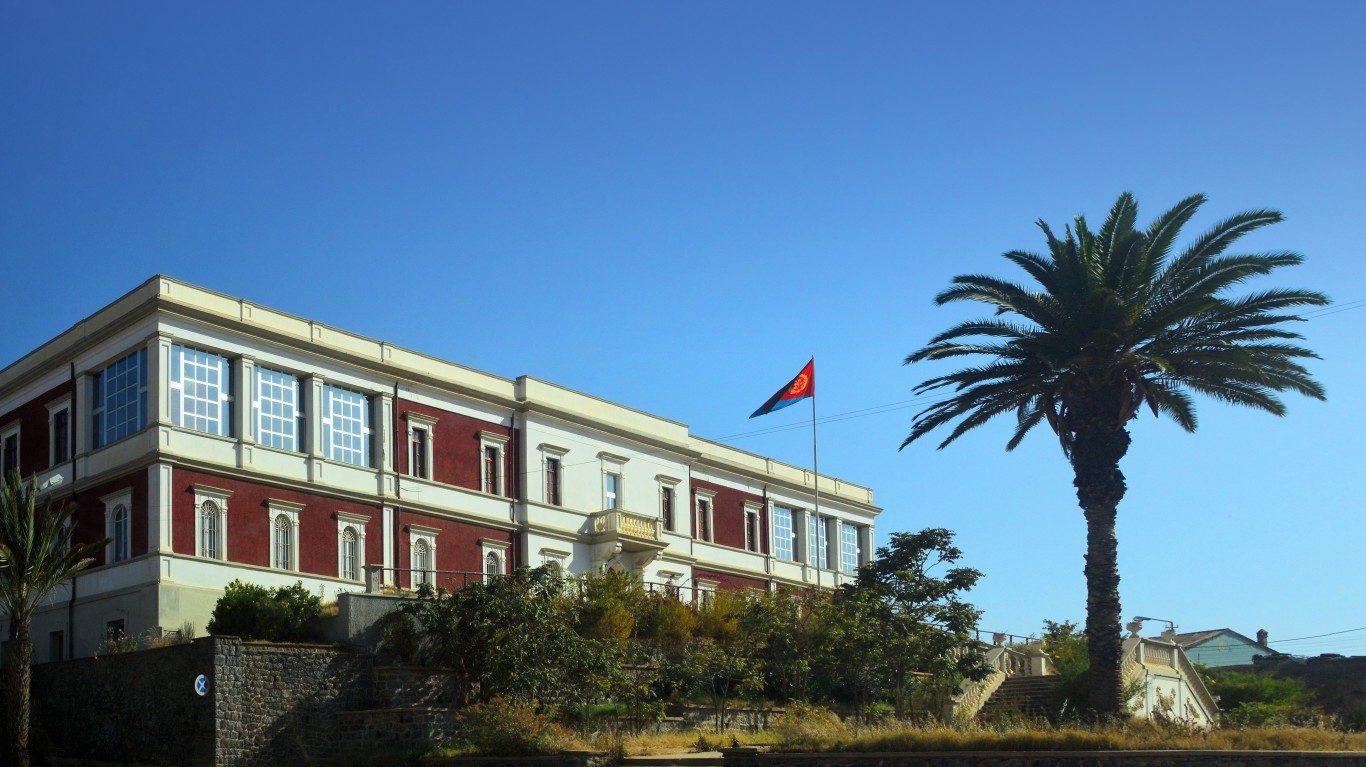
2. Eritrea
> Pct. population who are military personnel: 2.39% or 23.9 per 1,000
> Active-duty personnel: 150,000-200,000 — #32 largest of 168 countries
> Population: 6,274,796
> Military expenditure, 2003: $181.6 million — #126 highest of 162 countries
> Region: Africa
Unflatteringly nicknamed “Africa’s North Korea” for its repressive and isolationist reputation, Eritrea has one of the world’s most aggressive mandatory conscription policies. All adult citizens can be drafted for unlimited military service. The families of deserters can be targeted for punishment. This draconian tradition has its roots in Eritrea’s 30-year war for independence from Ethiopia, a much larger country by population, that ended in 1991. The two countries fought a second war over disputed territories from 1998 to 2000. A full peace treaty was signed in 2018.
[in-text-ad-2]
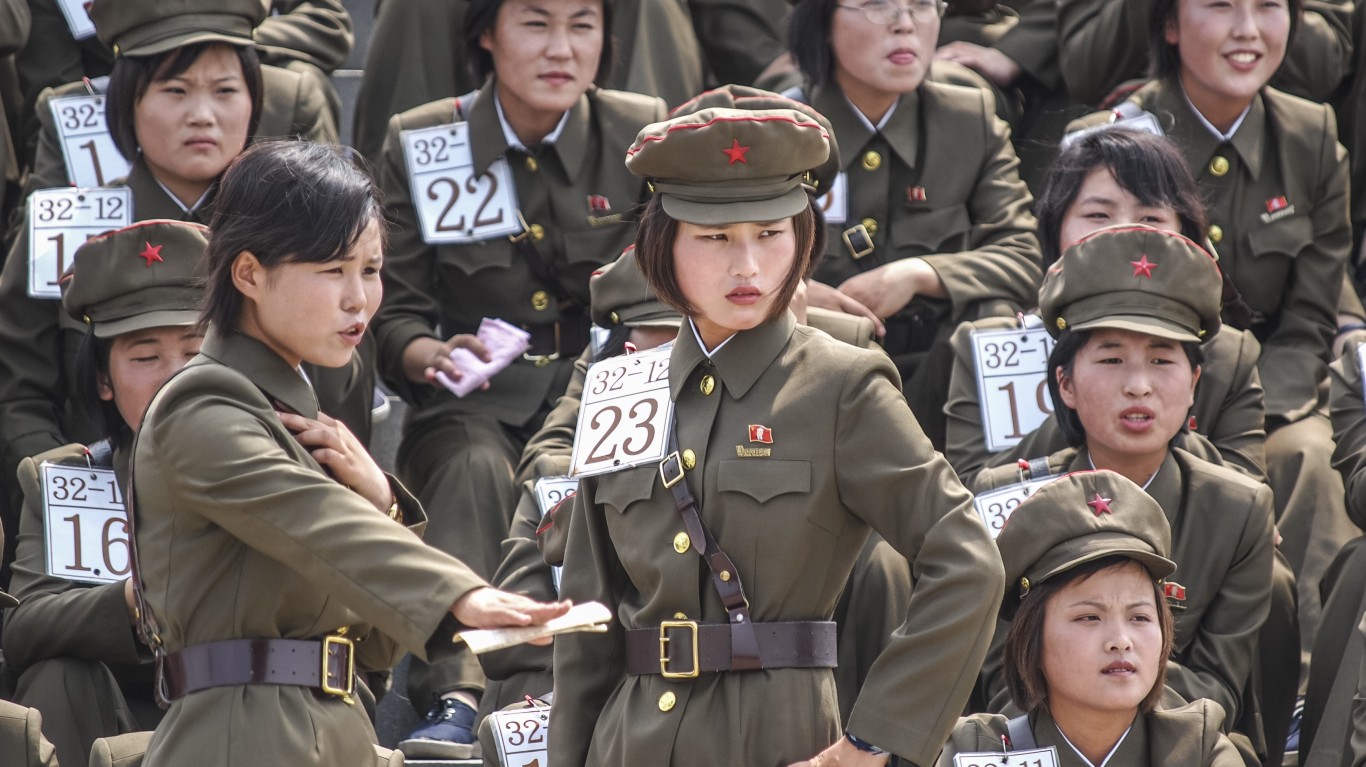
1. Korea, North
> Pct. population who are military personnel: 4.41% or 44.1 per 1,000
> Active-duty personnel: 1,150,000 — #4 largest of 168 countries
> Population: 26,072,217
> Military expenditure, 2018: $1.6 billion — #69 highest of 162 countries
> Region: East and Southeast Asia
The nuclear-armed hermit kingdom has the most draconian modern mandatory military conscription policy. All able-bodied North Koreans must enlist, typically after high school. Men serve for 10 years and women serve for seven years with one exception. Those who are accepted to college can defer service until after they graduate. Those with college diplomas serve fewer years. According to a defector writing in The Guardian newspaper in 2015, North Korean soldiers are often malnourished from meager rations, especially those stationed in the countryside, and are sometimes ordered to steal food from locals.
Methodology
To find the countries where the largest share of the population serves in the military, 24/7 Wall St. reviewed the CIA World Factbook’s Military and security service personnel strengths, which provides 2022 CIA estimates of each country’s active-duty military force. Country population figures also came from the CIA and are 2023 estimates. Countries are ranked by the share of the country’s active duty personnel relative to its population.
If the estimate is a range, the lower figure was considered. Only the 168 countries with data and active-duty personnel over 1,000 were considered. The list includes the Palestinian Territories of the West Bank and Gaza Strip, which the CIA counts separately.
The CIA has limited data for some countries and does not provide estimates for them. For example, the CIA notes that current estimates are not available for Syria but prior to the civil war it had approximately 300,000 active duty troops, or 1.3% of the population, which would rank it No. 7 on the list.
Military expenditure data came from the Stockholm International Peace Research Institute Military Expenditure Database and is in current U.S. dollars.
100 Million Americans Are Missing This Crucial Retirement Tool
The thought of burdening your family with a financial disaster is most Americans’ nightmare. However, recent studies show that over 100 million Americans still don’t have proper life insurance in the event they pass away.
Life insurance can bring peace of mind – ensuring your loved ones are safeguarded against unforeseen expenses and debts. With premiums often lower than expected and a variety of plans tailored to different life stages and health conditions, securing a policy is more accessible than ever.
A quick, no-obligation quote can provide valuable insight into what’s available and what might best suit your family’s needs. Life insurance is a simple step you can take today to help secure peace of mind for your loved ones tomorrow.
Click here to learn how to get a quote in just a few minutes.
Thank you for reading! Have some feedback for us?
Contact the 24/7 Wall St. editorial team.
 24/7 Wall St.
24/7 Wall St.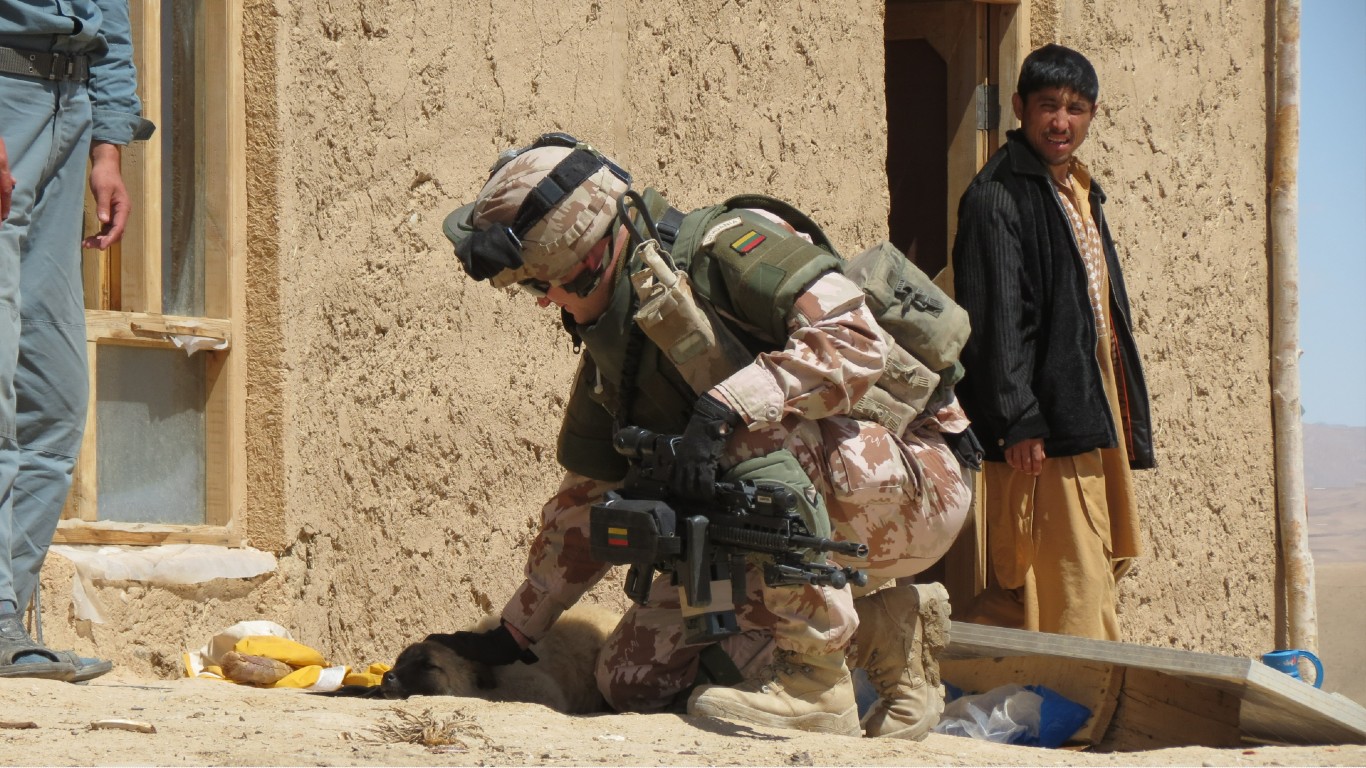
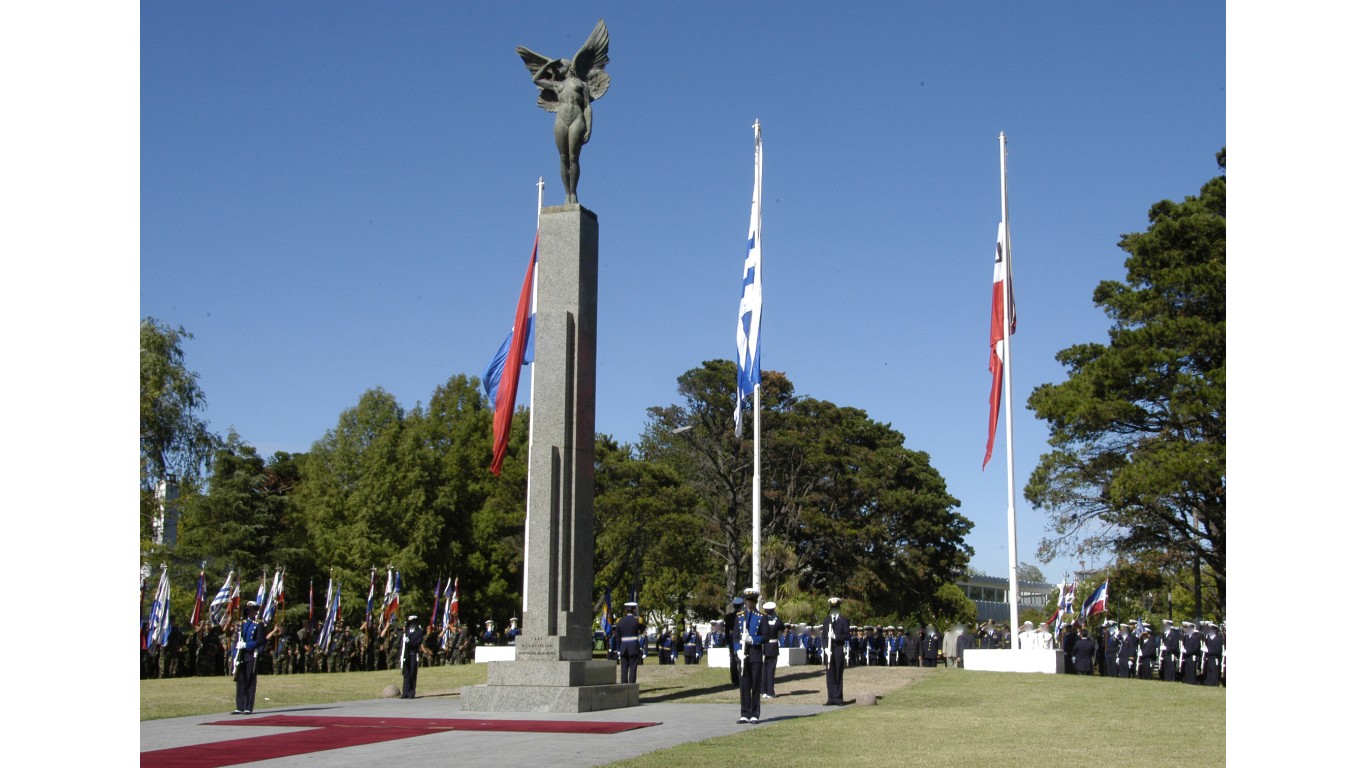
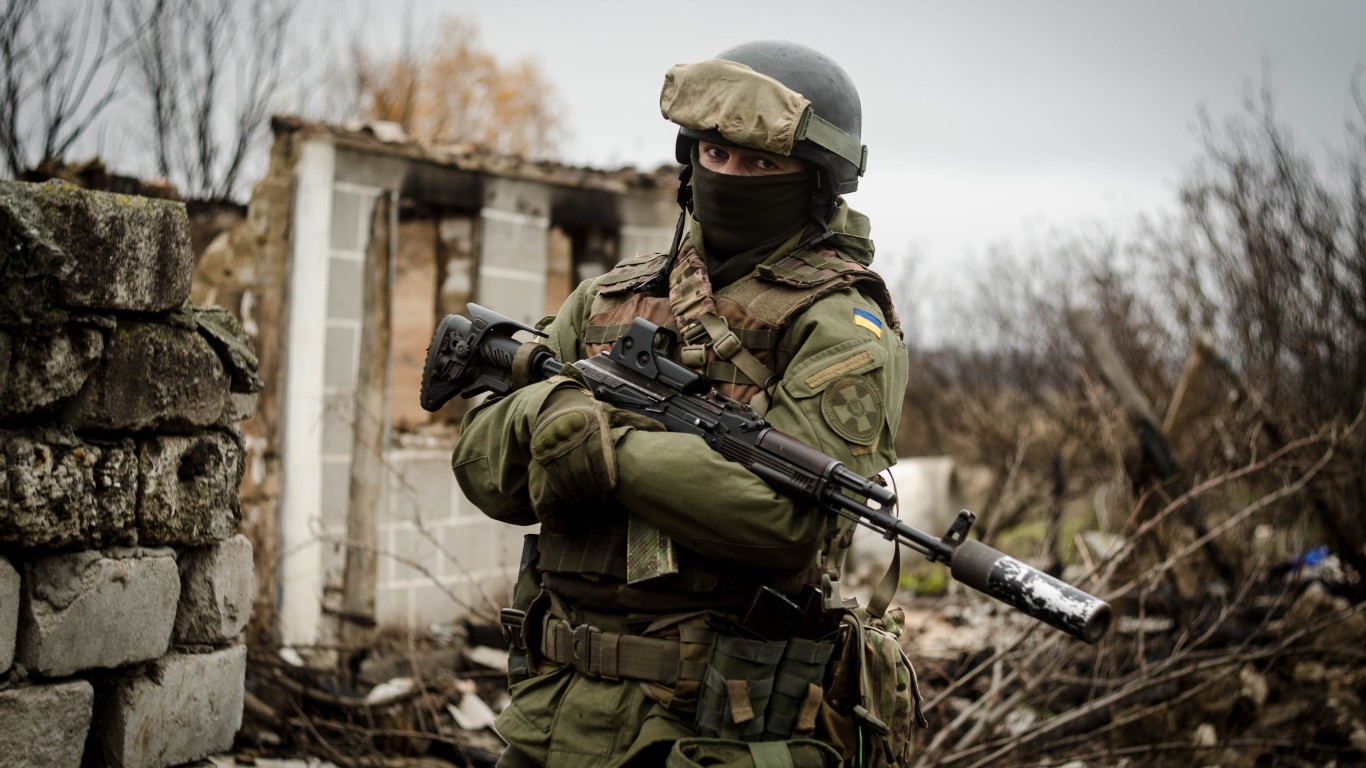 24/7 Wall St.
24/7 Wall St.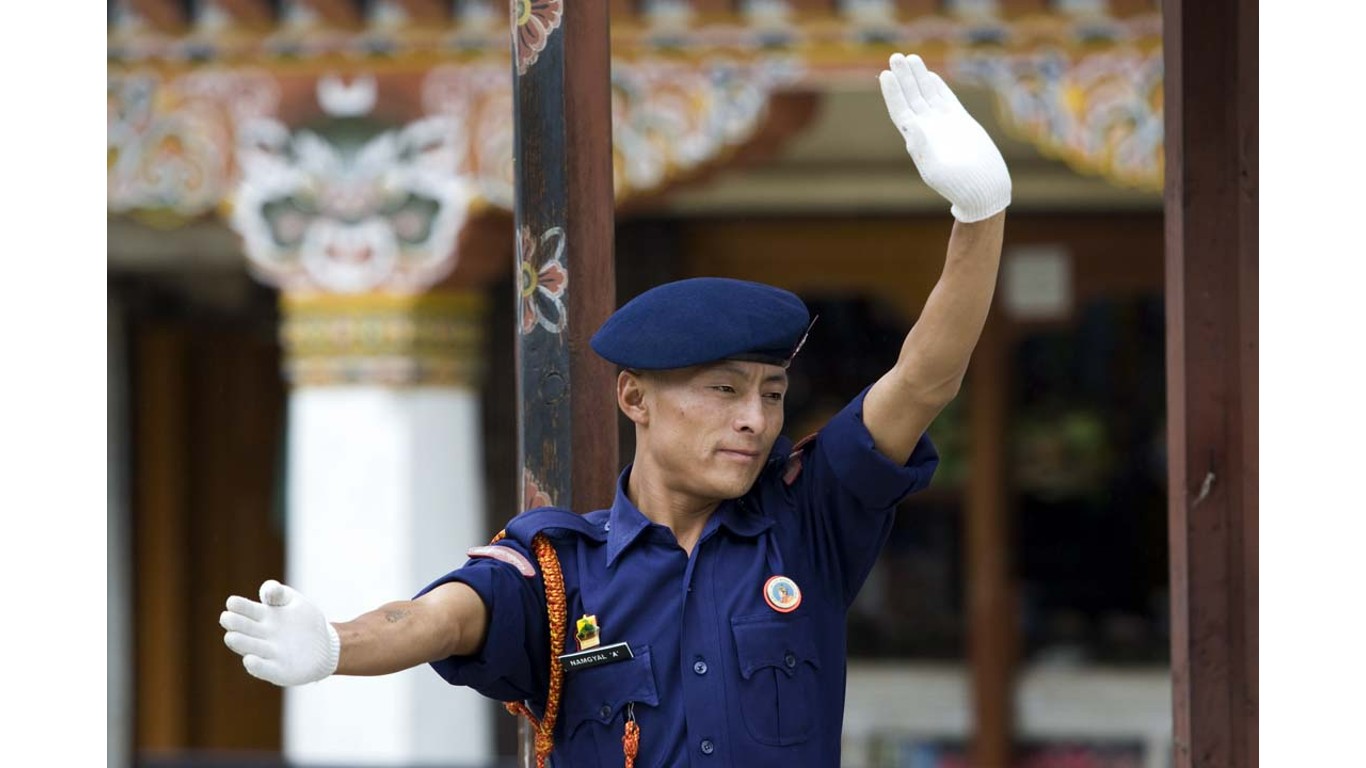
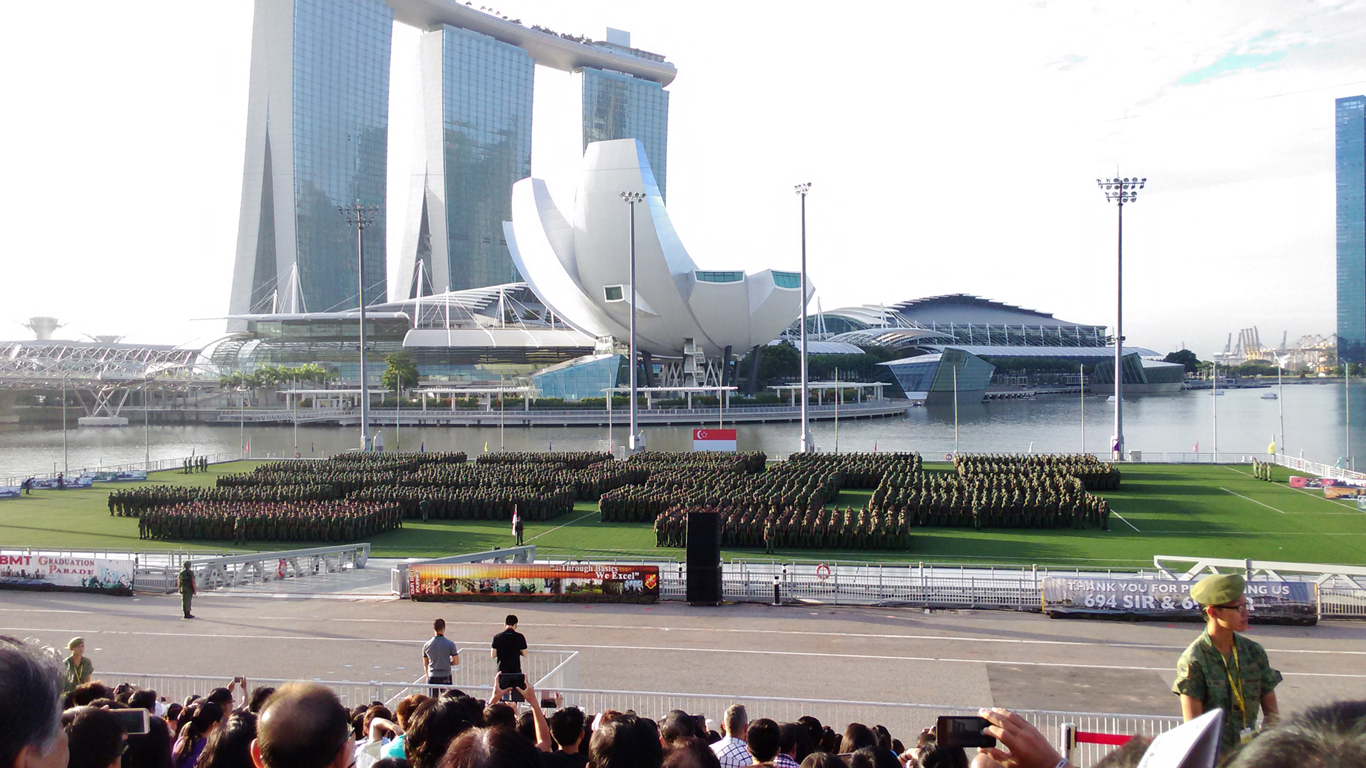
 24/7 Wall St.
24/7 Wall St.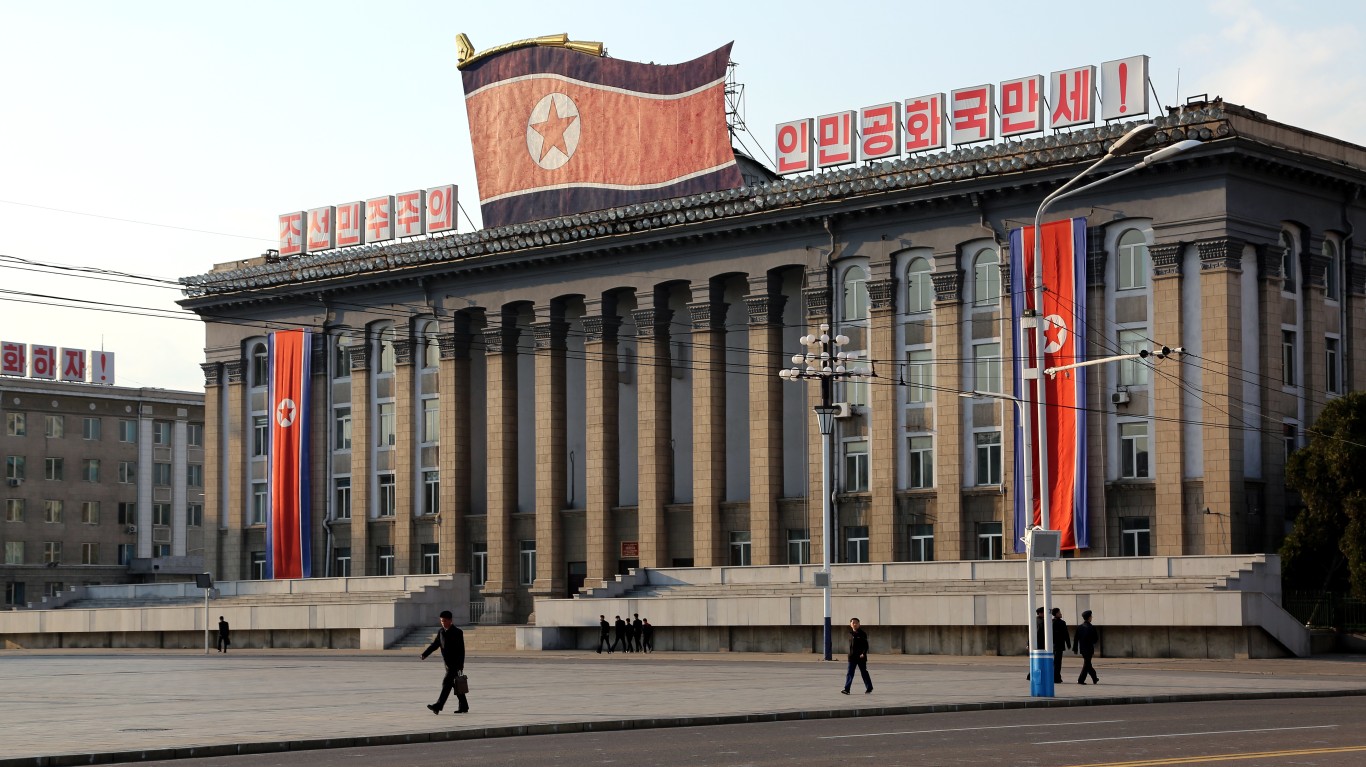 24/7 Wall St.
24/7 Wall St.

